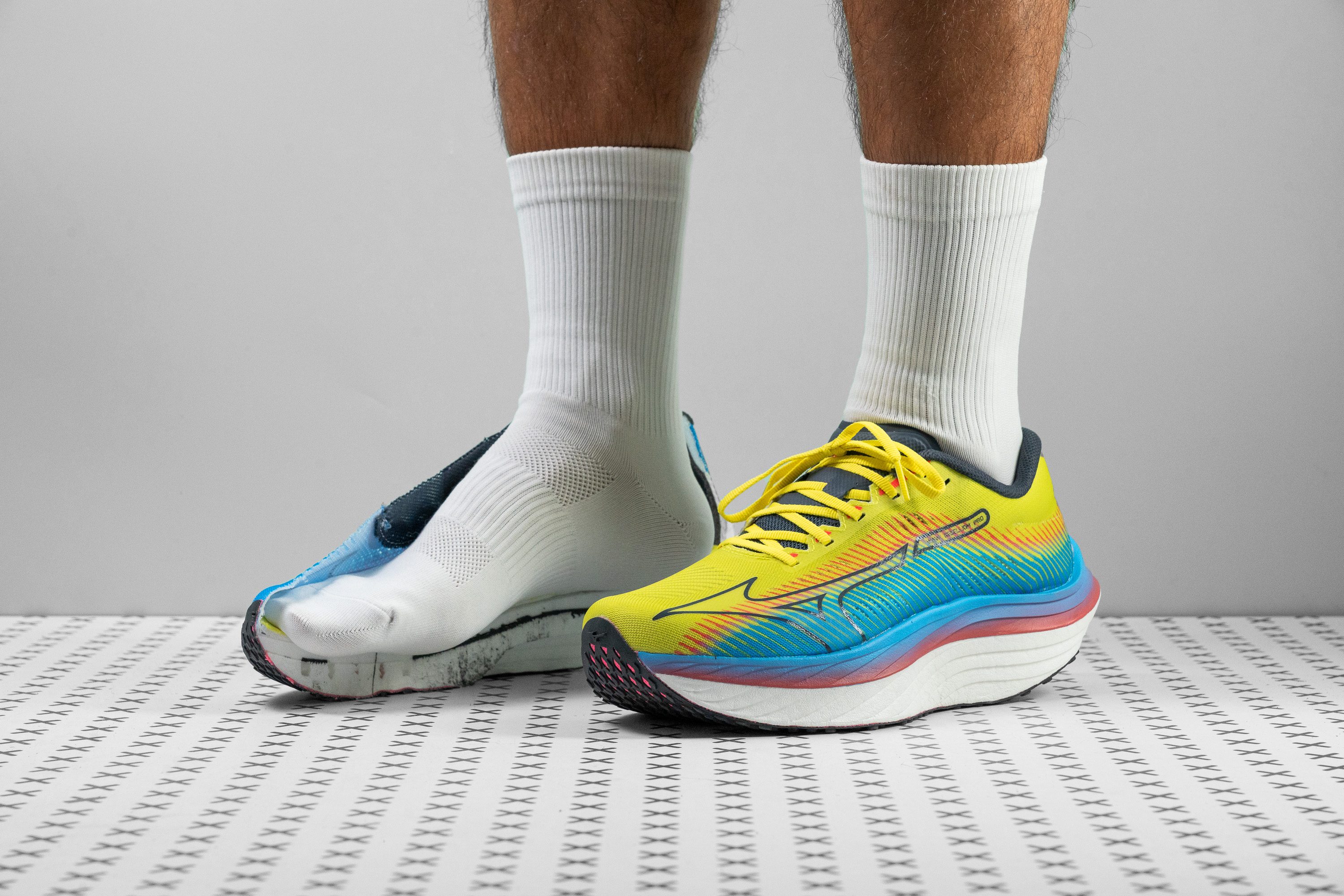Our verdict
Pros
- Exceptionally extreme in every aspect
- Incredibly enjoyable and fun ride
- Ideal for midfoot strikers
- Abundant race-day legal cushioning
- Outsole provides excellent grip, even in wet conditions
- Less stiff compared to other racing shoes
- Cozy and decently wide upper
Cons
- Might feel really weird at first
- Definitely not suitable for heel strikers
- Subpar durability
Audience verdict
- Top 17% in road running shoes
- Top 27% in lightweight running shoes
Comparison
The most similar running shoes compared
+ + Add a shoe | |||||
|---|---|---|---|---|---|
| Audience score | 90 Superb! | 90 Superb! | 86 Good! | 90 Superb! | |
| Price | $250 | $250 | $250 | $230 | |
| Pace | Competition | Competition | Competition | CompetitionTempo | |
| Shock absorption | - | High | High | High | |
| Energy return | - | High | High | High | |
| Traction | - | High | High | High | |
| Arch support | Neutral | Neutral | Neutral | Neutral | |
| Weight lab Weight brand | 7.5 oz / 214g 7.7 oz / 218g | 6.5 oz / 183g 6.4 oz / 181g | 8 oz / 227g 7.7 oz / 218g | 7.2 oz / 204g 7.4 oz / 209g | |
| Lightweight | ✓ | ✓ | ✓ | ✓ | |
| Drop lab Drop brand | 4.9 mm 4.5 mm | 6.5 mm 5.0 mm | 5.4 mm 4.0 mm | 10.6 mm 8.0 mm | |
| Strike pattern | Mid/forefoot | Mid/forefoot | Mid/forefoot | Heel | |
| Size | Half size small | Slightly small | - | True to size | |
| Midsole softness | Firm | Balanced | Soft | Soft | |
| Difference in midsole softness in cold | Small | Small | Small | Normal | |
| Toebox durability | Bad | Good | Good | Bad | |
| Heel padding durability | Decent | Good | Bad | Good | |
| Outsole durability | Bad | Good | Decent | Decent | |
| Breathability | Moderate | Breathable | Moderate | Moderate | |
| Width / fit | Narrow | Narrow | Medium | Medium | |
| Toebox width | Medium | Medium | Medium | Narrow | |
| Stiffness | Stiff | Stiff | Stiff | Stiff | |
| Torsional rigidity | Stiff | Stiff | Stiff | Stiff | |
| Heel counter stiffness | Flexible | Flexible | Flexible | Flexible | |
| Plate | Carbon plate | Carbon plate | Carbon plate | Carbon plate | |
| Rocker | ✓ | ✓ | ✓ | ✓ | |
| Heel lab Heel brand | 38.2 mm 39.0 mm | 39.1 mm 39.5 mm | 39.9 mm 39.5 mm | 39.2 mm 40.0 mm | |
| Forefoot lab Forefoot brand | 33.3 mm 34.5 mm | 32.6 mm 34.5 mm | 34.5 mm 35.5 mm | 28.6 mm 32.0 mm | |
| Widths available | Normal | NormalWide | NormalWide | Normal | |
| Orthotic friendly | ✓ | ✓ | ✓ | ✓ | |
| Season | All seasons | SummerAll seasons | All seasons | All seasons | |
| Removable insole | ✓ | ✓ | ✓ | ✓ | |
| Ranking | #107 Top 16% | #79 Top 21% | #191 Top 50% | #39 Top 11% | |
| Popularity | #476 Bottom 30% | #155 Top 41% | #180 Top 47% | #44 Top 12% |
Who should buy
Based on our tests, the Mizuno Wave Rebellion Pro is an interesting option for certain types of runners:
- Midfoot strikers in search of a well-cushioned marathon racer, provided they don't require additional stability
- Mizuno aficionados eager to include the brand's top-performing racing shoe to their collection
- Those ready to take on an unconventional, wild road racing shoe
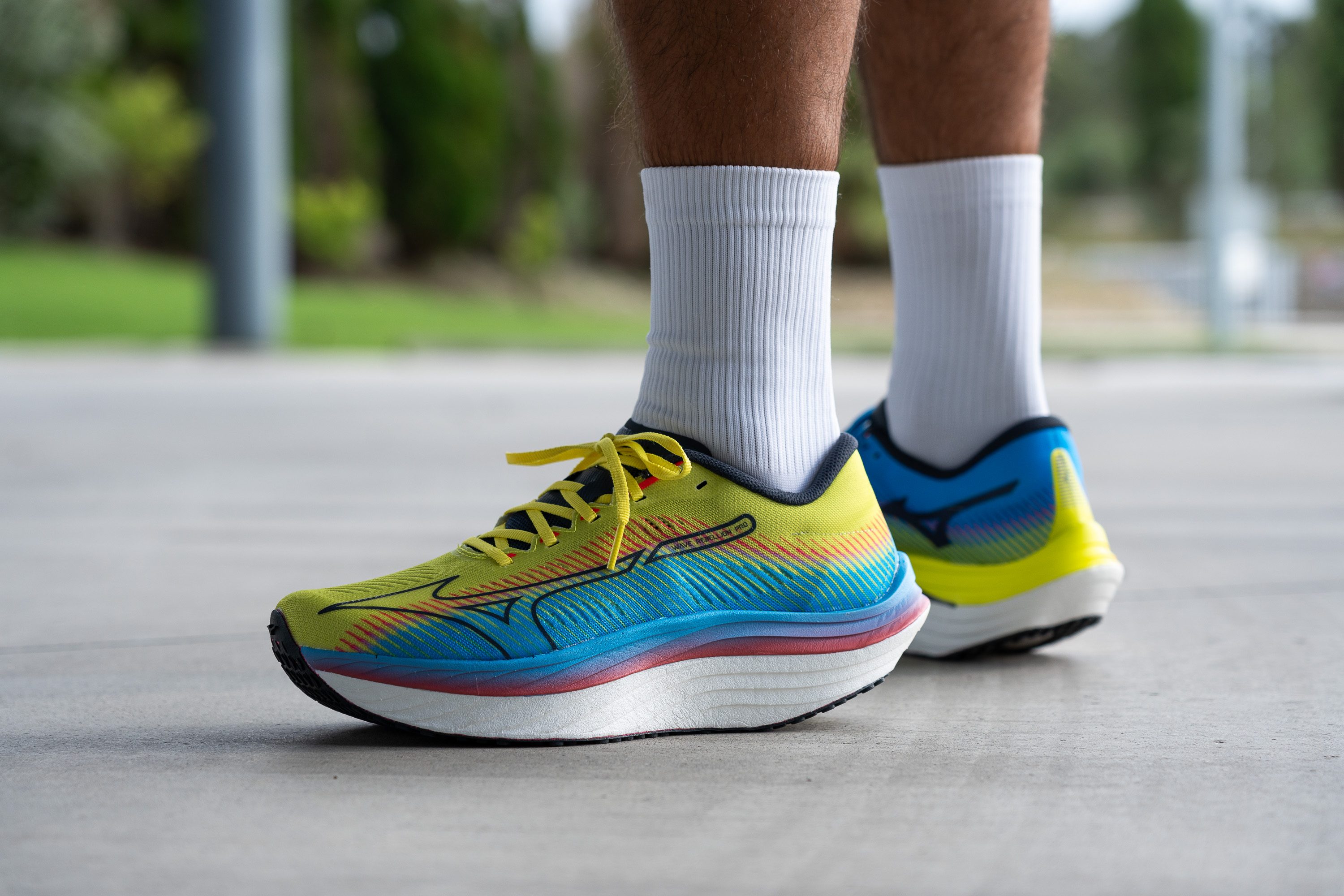
Who should NOT buy
For heel strikers and forefoot strikers, opting for this shoe may not be the best choice, as its benefits won't align with your running style. Instead, we suggest considering the Saucony Endorphin Pro 3 (for heel strikers) or the ASICS Metaspeed Sky+ (for forefoot strikers).
Runners seeking a reliable, risk-free option for their upcoming race might also want to bypass the Wave Rebellion Pro.
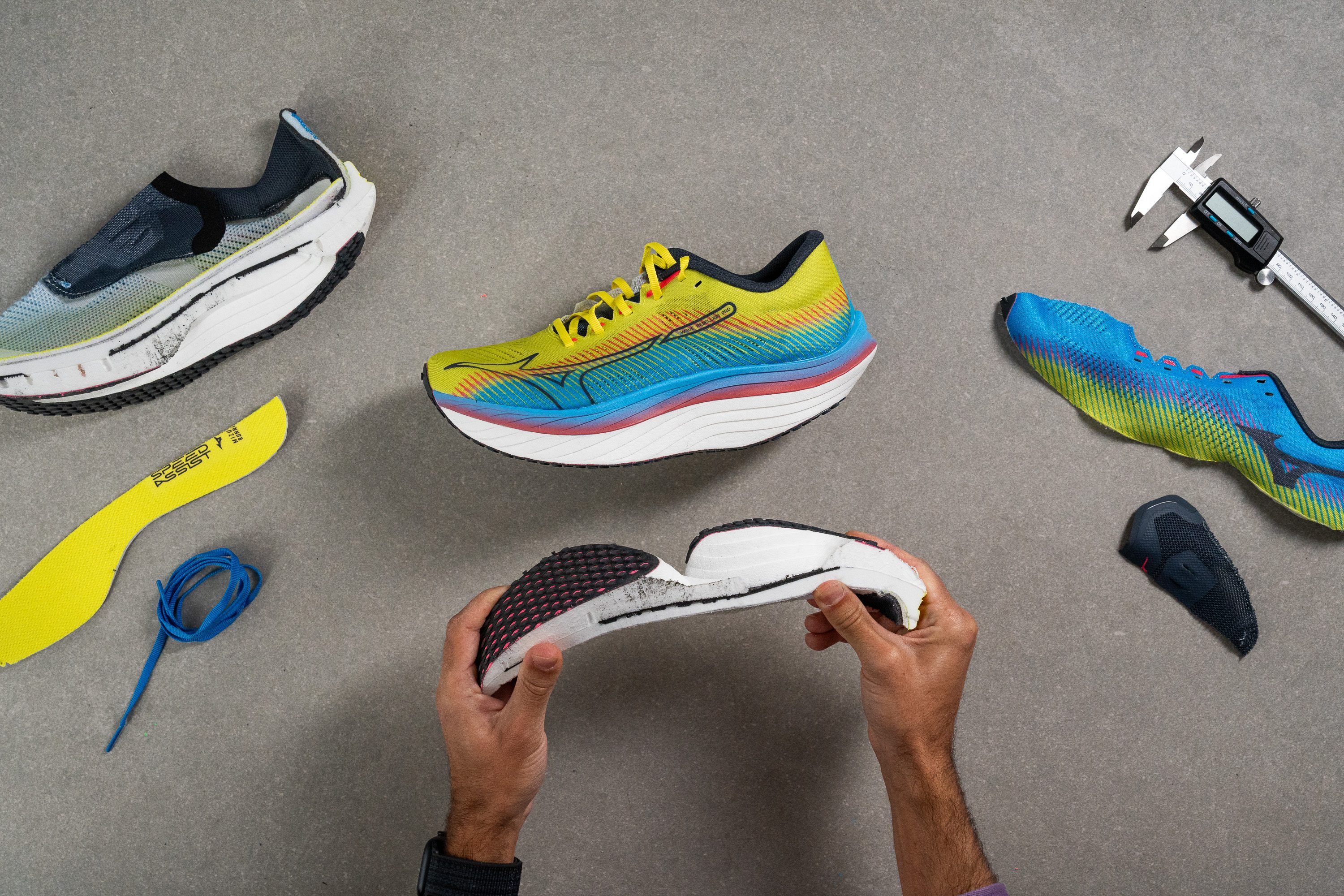
Several well-established racing shoes, such as the Adidas Adizero Adios Pro 3 and Hoka Rocket X 2, provide solid performances without the specific demands of the Wave Rebellion Pro. These alternatives boast full-length premium midsoles and superior stability.
Cushioning
Heel stack
Mizuno implemented a smart strategy with this shoe. They aimed to provide as much cushioning as possible without exceeding the 40-mm limit set by World Athletics at the official heel measurement point.
To achieve this, they removed a portion of foam from the heel, ensuring compliance with regulations as our measurement came in at 38.2 mm.
However, the midfoot offers nothing less than 51 mm, making it the most cushioned yet race-day legal shoes ever produced. That's Japanese innovation!
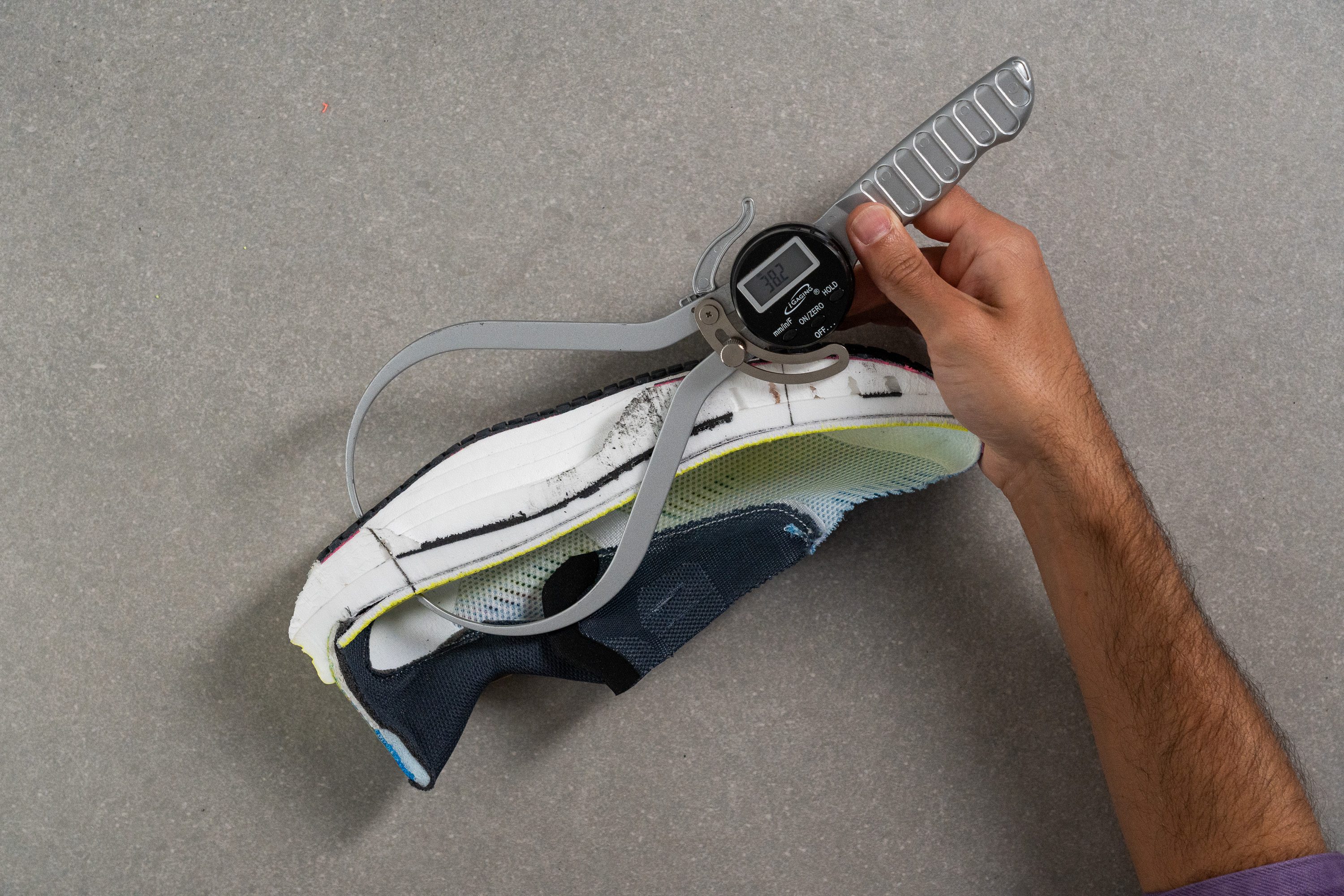
| Wave Rebellion Pro | 38.2 mm |
| Average | 34.8 mm |
Forefoot stack
In the forefoot, the shoe has a measurement of 33.3 mm, similar to many racing shoes, once again meeting World Athletics' standards.
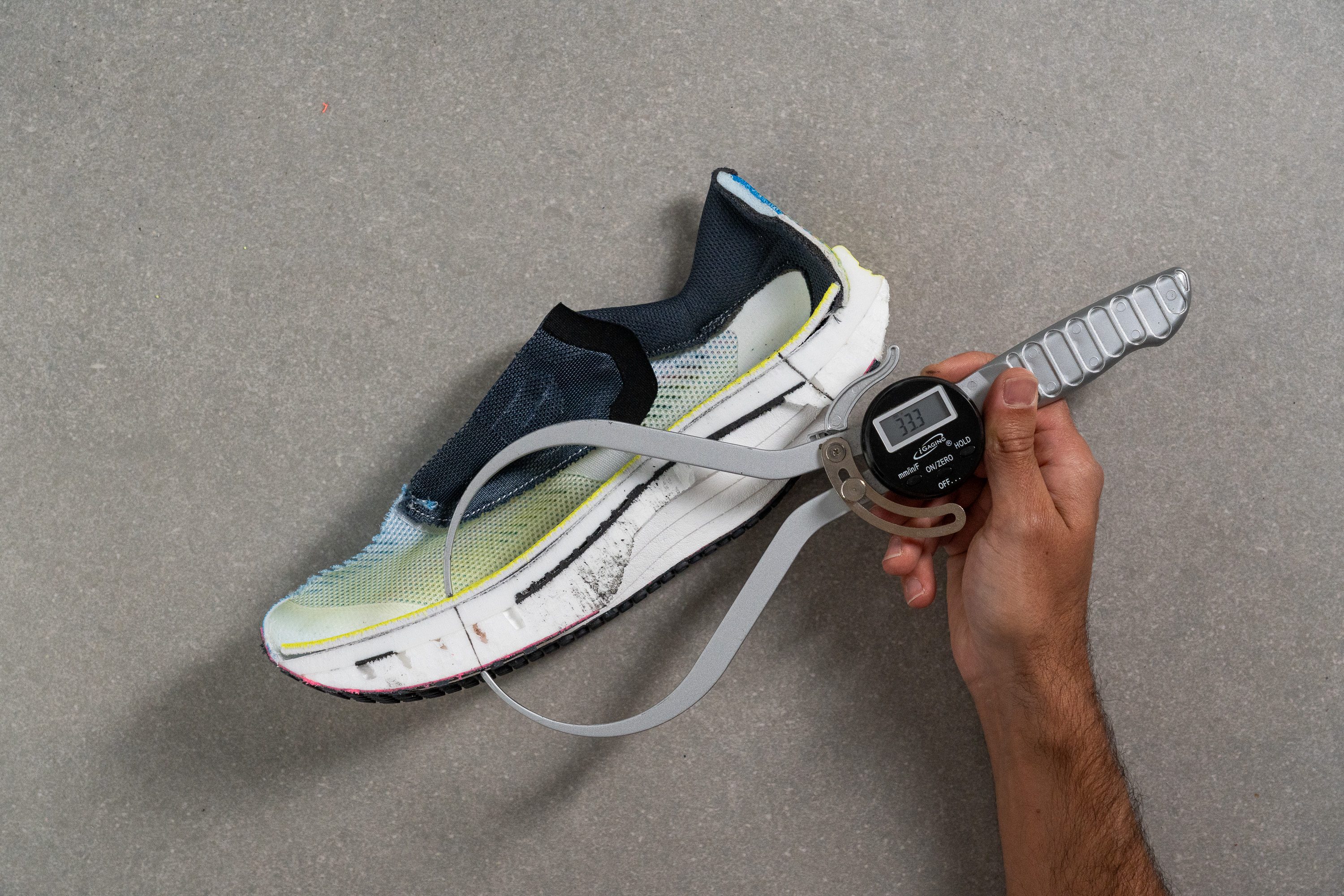
| Wave Rebellion Pro | 33.3 mm |
| Average | 26.2 mm |
Drop
And what about the drop? While the difference between the heel and the forefoot is 4.9 mm, that doesn't tell the whole story.
Examining the cross-section of the shoe reveals an unconventional geometry: instead of a gradual decline from heel to forefoot, the thickest portion of foam is situated around the midfoot.
This shoe is specifically tailored for fast runners who use a midfoot striking technique, and we can confirm it is not suitable for heel strikers and likely many forefoot strikers as well.
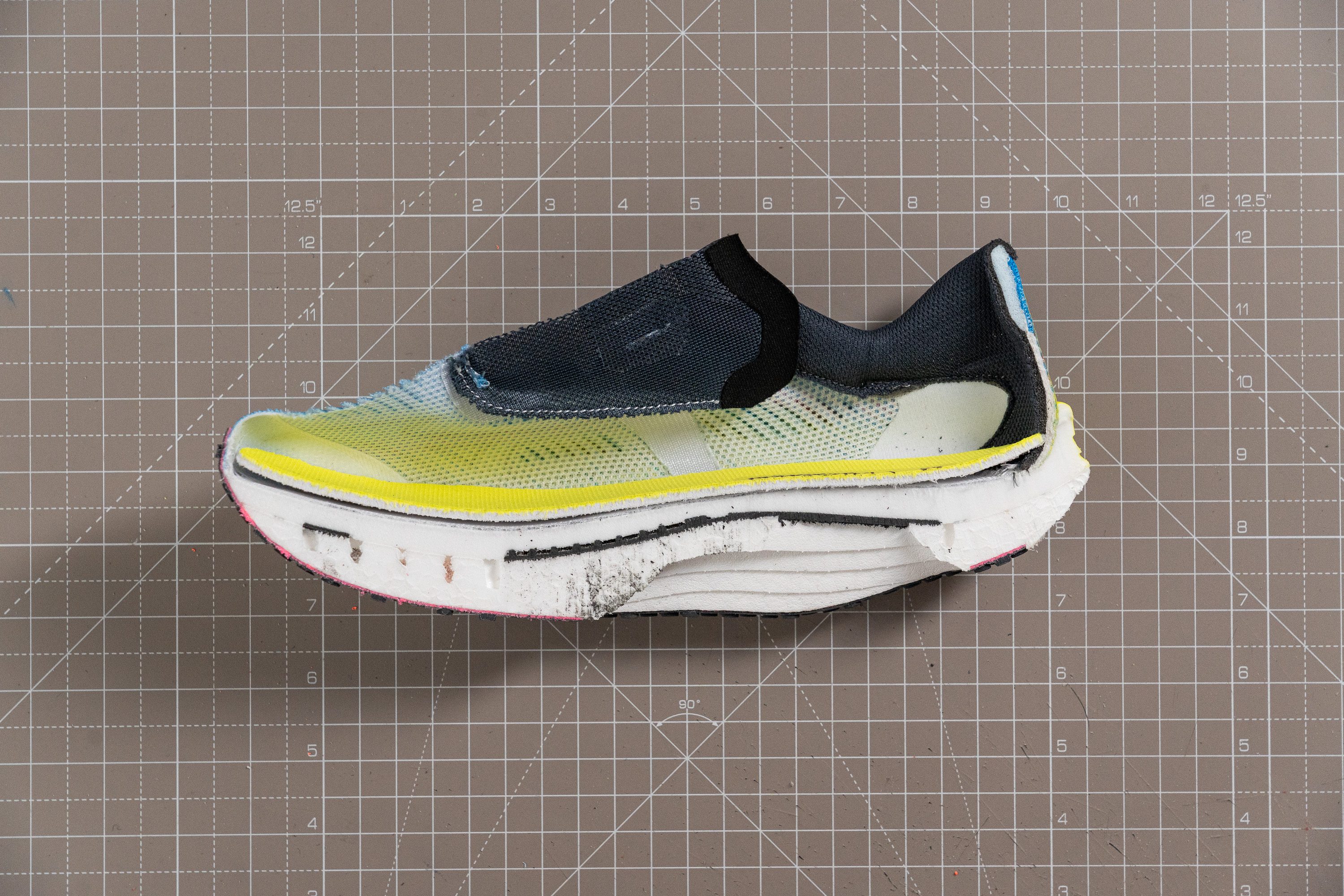
| Wave Rebellion Pro | 4.9 mm |
| Average | 8.6 mm |
Midsole softness
Yes, the insole was quite standard, so let's return to the bizarre stuff.
Unlike most racing shoes that provide a single layer of bouncy foam, Mizuno chose a dual-foam setup comprising a plush foam and a brick-like foam, aiming for a balanced ride.
The first foam we assessed is Mizuno Enerzy Lite, the one closer to the ground. It's a firm (30.4 HA) TPE foam that is lightweight and durable, but it somewhat lacks energy return—one of the features we appreciate most in racing shoes.
When paying a premium price for a shoe, we expect premium foam, and unfortunately, Enerzy Lite doesn't meet the mark.
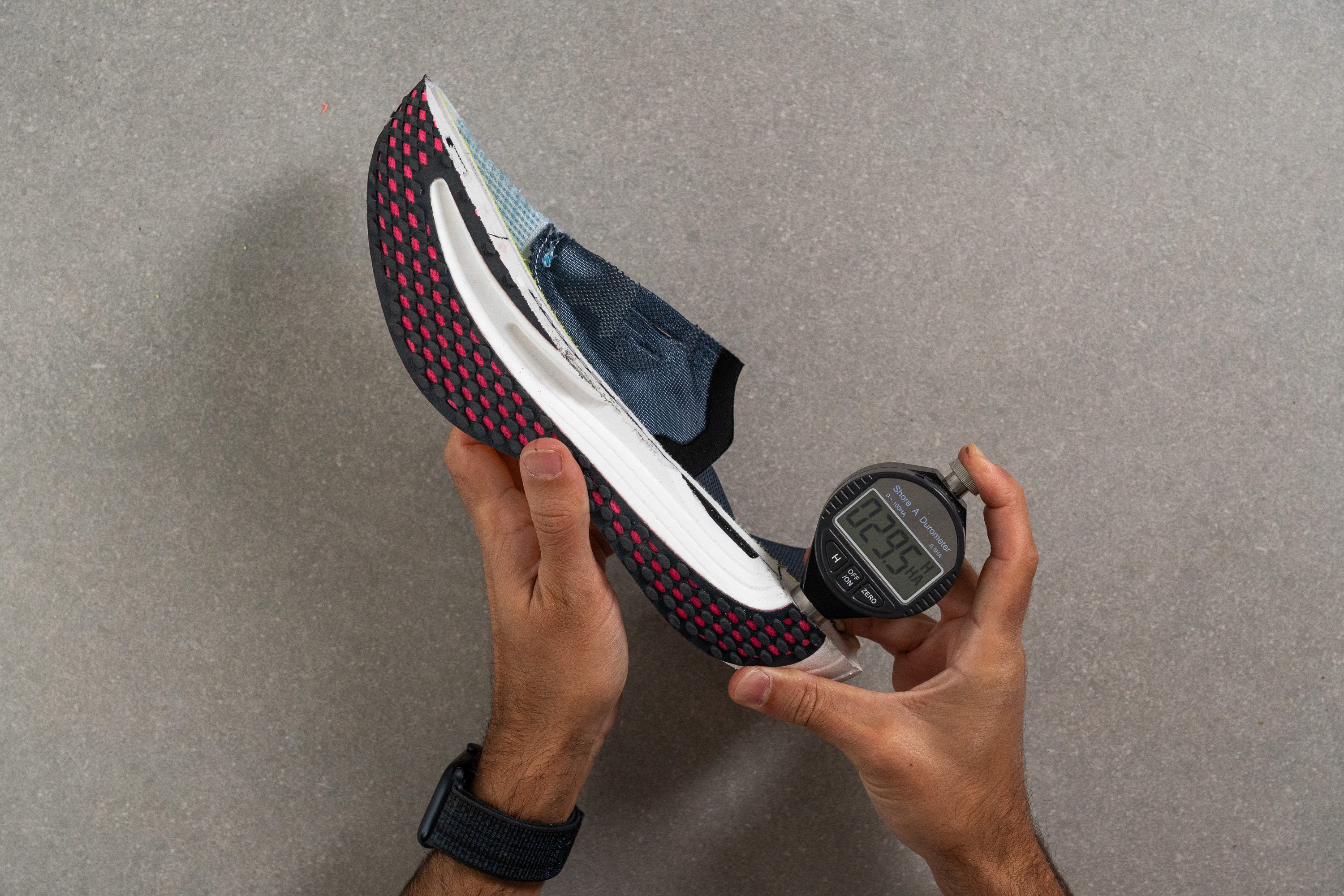
| Wave Rebellion Pro | 30.4 HA |
| Average | 20.4 HA |
Secondary foam
The other foam in this two-part midsole setup is Enerzy Lite+, a PEBA foam that's both soft and impressively springy. In our durometer tests, it scored a 16.0 HA measurement, and it certainly feels wonderful underfoot, offering massive energy return.
To fight with the top-tier shoes, the next version of the Wave Rebellion Pro should use only this foam. Mizuno just needs to slightly adjust the formulation of the layer closer to the ground to make it a tad firmer in order to boost stability.
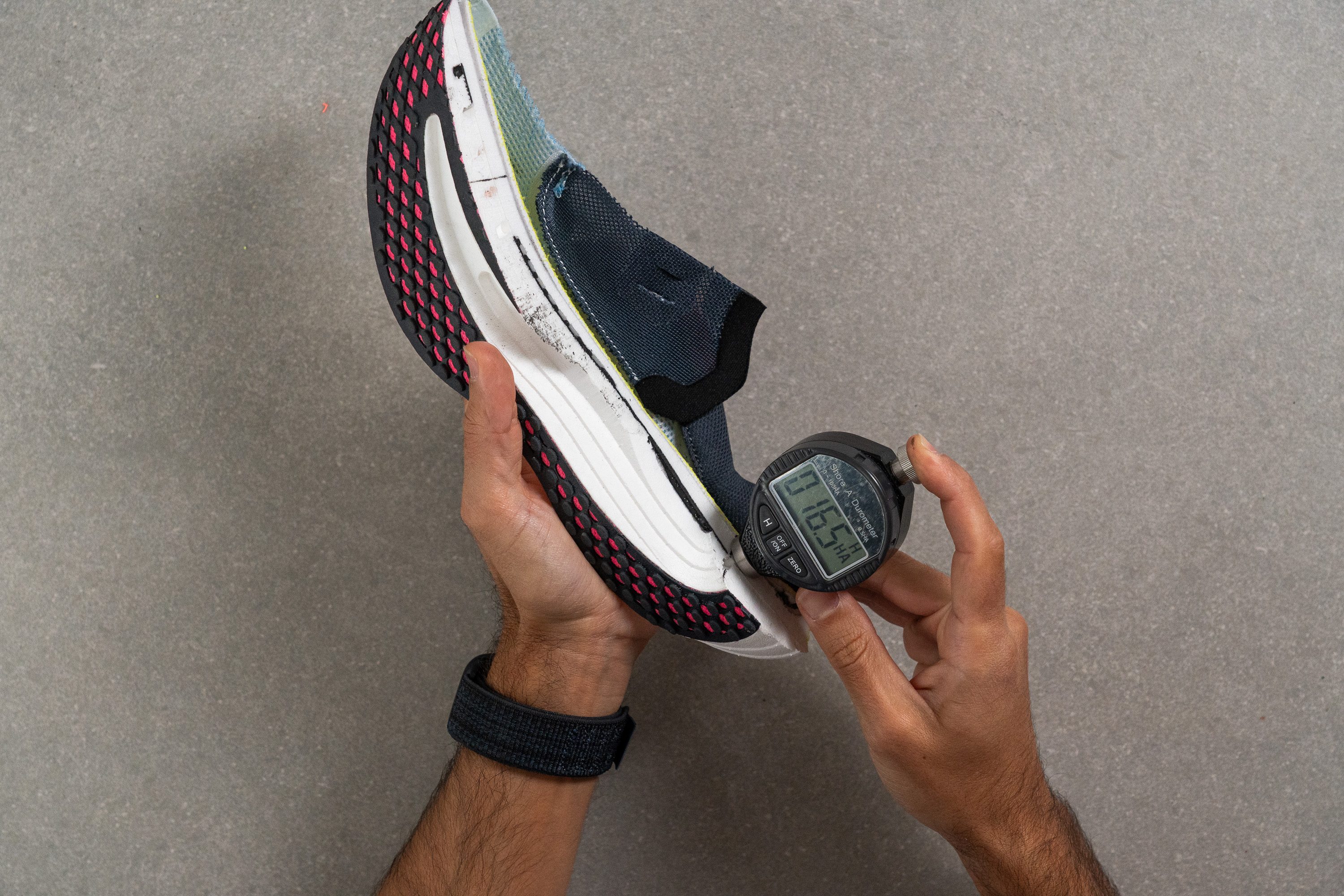
| Wave Rebellion Pro | 16.0 HA |
| Average | 22.7 HA |
Size and fit
Size
Mizuno Wave Rebellion Pro fits half size small (15 votes).
Consider sizing up
Internal length
| Wave Rebellion Pro | 265.0 mm |
| Average | 269.4 mm |
Width / Fit
Upon first slipping into the Wave Rebellion Pro, we marveled at the incredibly welcoming fit of the upper, arguably one of the best we've ever experienced in a racing shoe.
Sure enough, our measurement confirmed this superb comfort, clocking in at an impressive 98.0 mm.
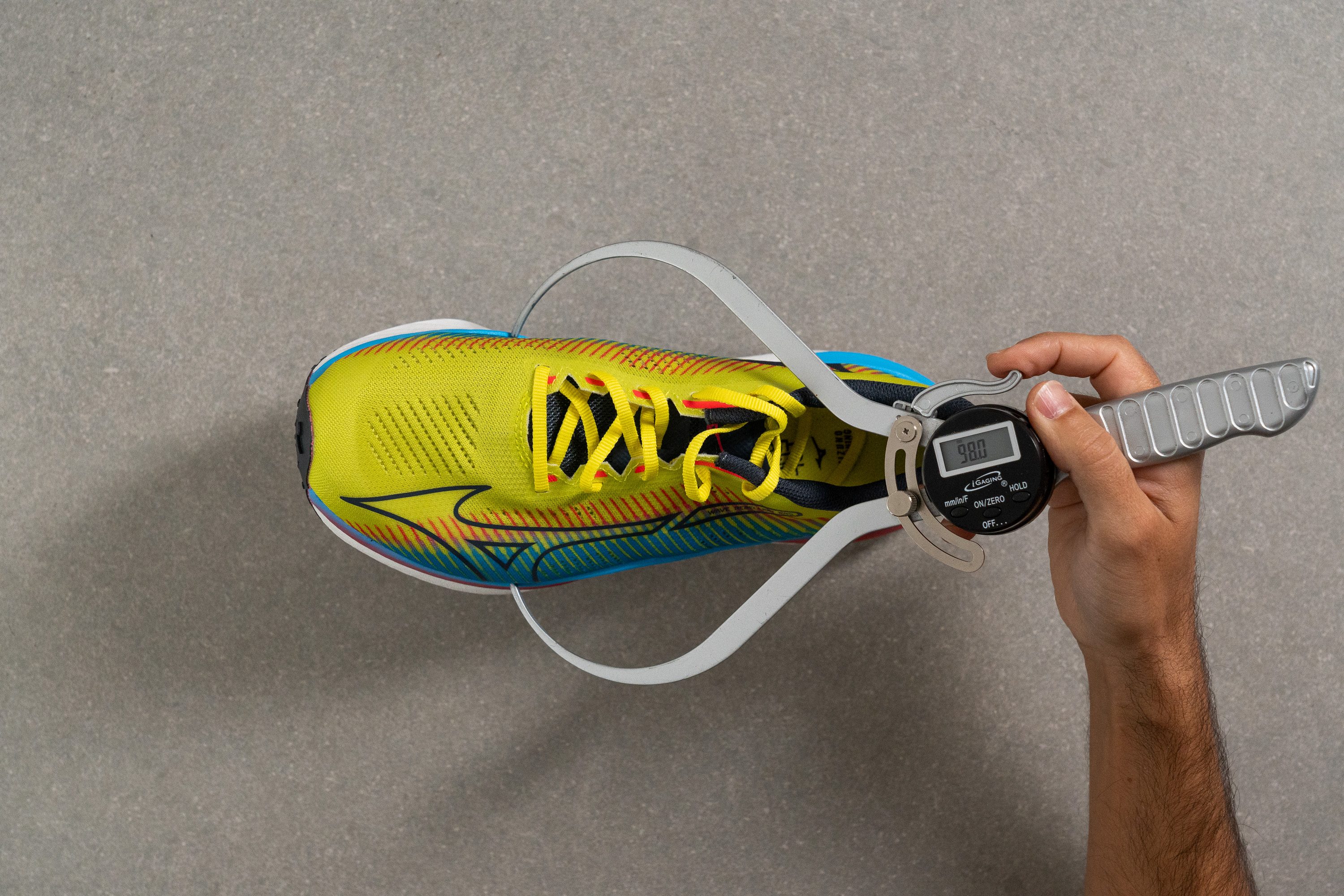
This test follows an older methodology, which is why you don't see recently tested shoes in the chart. Results from different methodologies can not be compared.
| Wave Rebellion Pro | 98.0 mm |
| Average | 98.5 mm |
Toebox width
The toe space isn't super roomy, narrowing down to just 75.2 mm at the toe cap. But let's be real, it's a racing shoe, so that's kind of what we're signing up for.
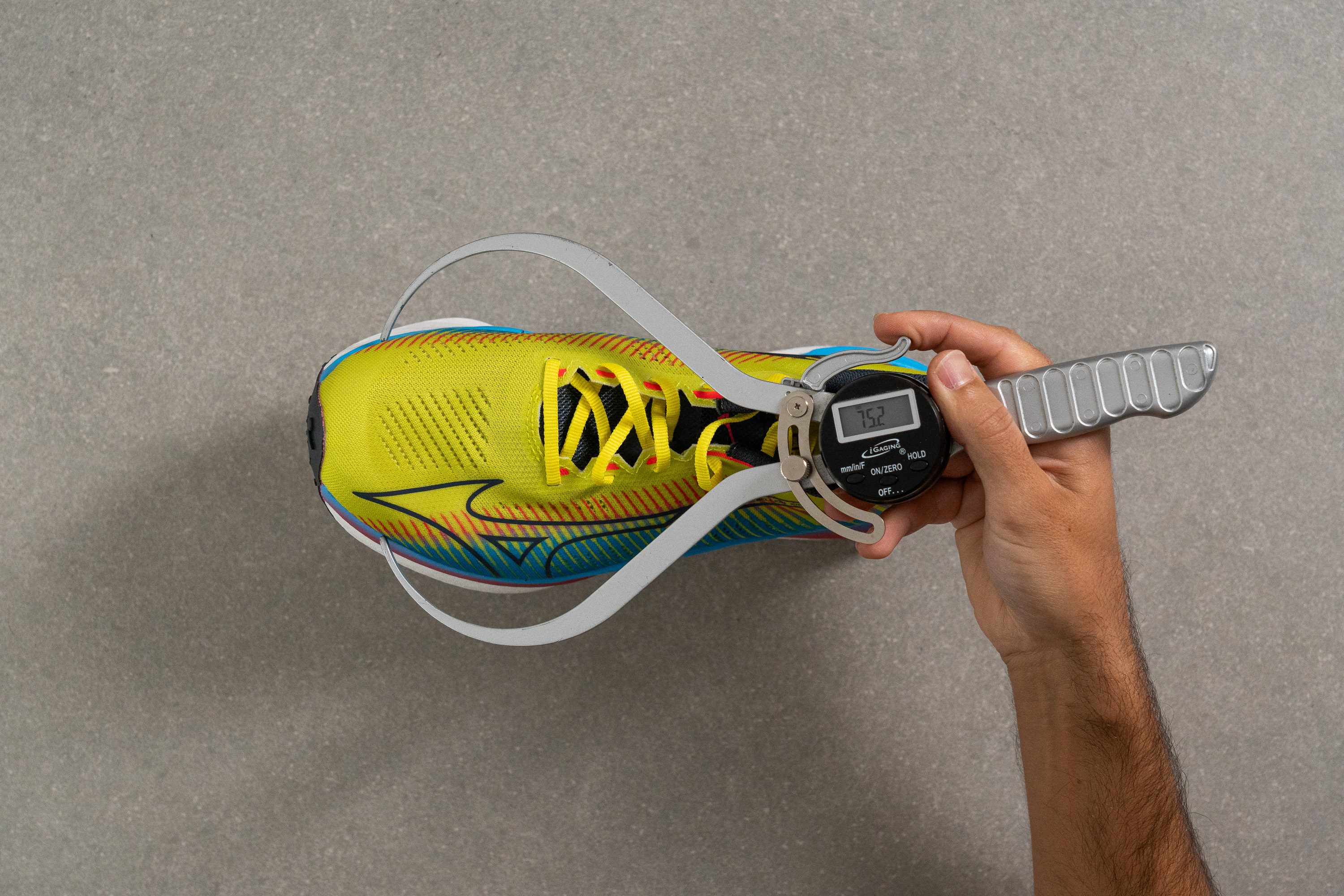
This test follows an older methodology, which is why you don't see recently tested shoes in the chart. Results from different methodologies can not be compared.
| Wave Rebellion Pro | 75.2 mm |
| Average | 78.4 mm |
Flexibility / Stiffness
The Mizuno Wave Rebellion Pro comes equipped with a plate sandwiched between the Enerzy Lite and Enerzy Lite+ foams, leading us to anticipate a high score in our stiffness test.
Surprisingly, with a result of 42.8N, it isn't exceptionally stiff, and there's a reason behind this.
Contrary to most racing shoes, the plate isn't entirely made of carbon fiber. Instead, it's a blend of 70% nylon and 30% carbon fiber. Additionally, the plate features an opening in the forefoot, further decreasing the stiffness.
This test follows an older methodology, which is why you don't see recently tested shoes in the chart. Results from different methodologies can not be compared.
| Wave Rebellion Pro | 42.8N |
| Average | 28.1N |
Stiffness in cold (%)
After chilling the shoe in the freezer for an additional 20 minutes, we conducted the test again and found that it required 57.9N of force.
A 35.4% change is quite significant compared to other high-end racing shoes. This is definitely another aspect where Mizuno needs to improve for v2.
| Wave Rebellion Pro | 35% |
| Average | 33% |
Weight
Weighing in at just 7.5 oz or 214g, the Mizuno Wave Rebellion Pro is remarkably light for its size. This is achieved by not using a solid slab of foam for the outsole.
Instead, it has several cutouts that help minimize weight but also result in less foam underfoot.
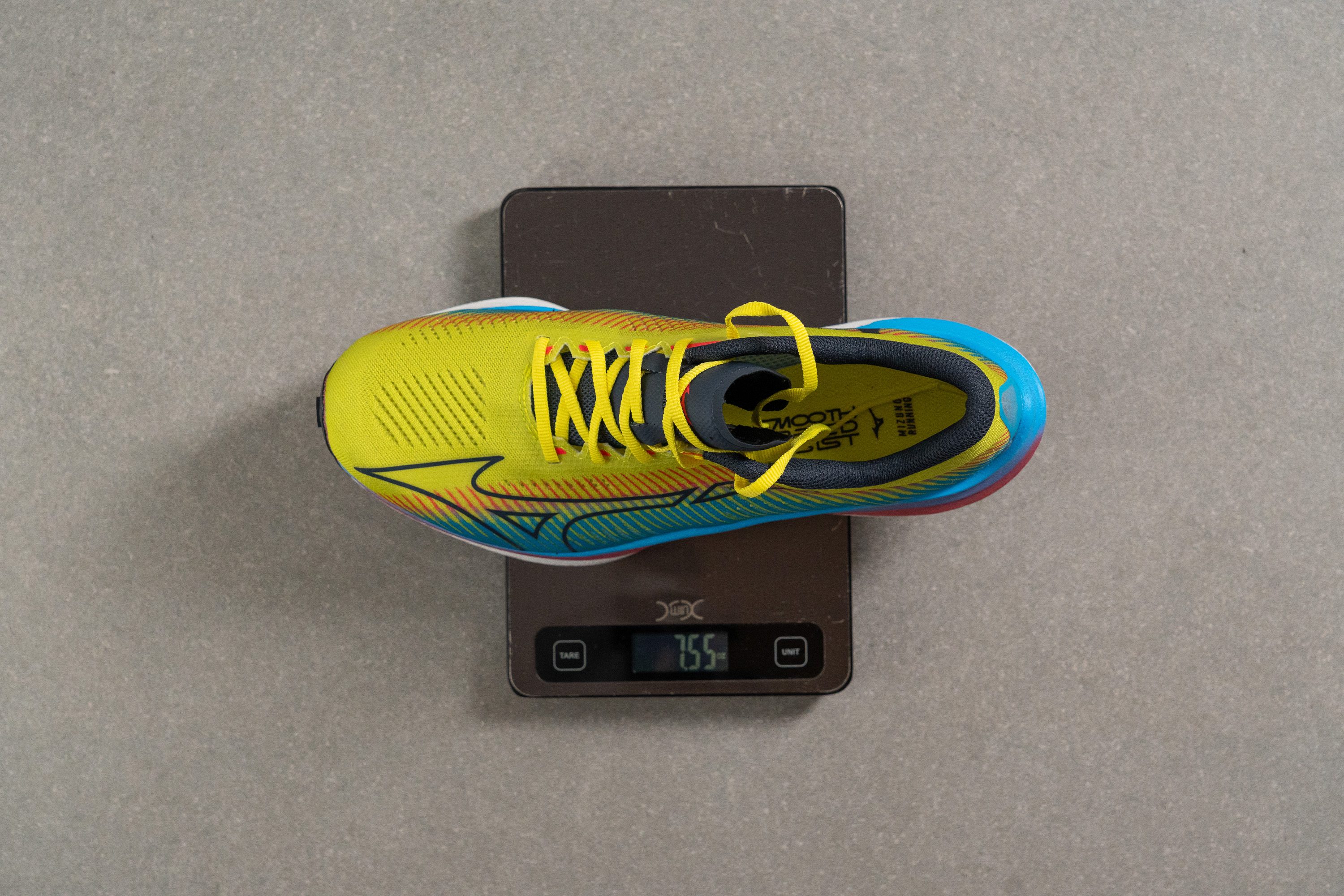
| Wave Rebellion Pro | 7.5 oz (214g) |
| Average | 9.3 oz (264g) |
Breathability
We expect shoes that are priced at $250 to offer excellent breathability, but the Mizuno Wave Rebellion Pro disappoints us in this aspect. Our lab tests resulted in a modest 3/5 score.
This outcome was unexpected for us, emphasizing the need for lab testing in running shoes. If we had only conducted the light test, we might have assumed the Wave Rebellion Pro was breathable—since the entire upper appeared that way. Sadly, this was not the case.
Despite the large ventilation holes we noticed under the microscope, the shoes didn't score well regarding breathability.

In fact, these holes are the reason it got a 3/5 score; otherwise, it would have received the lowest score.
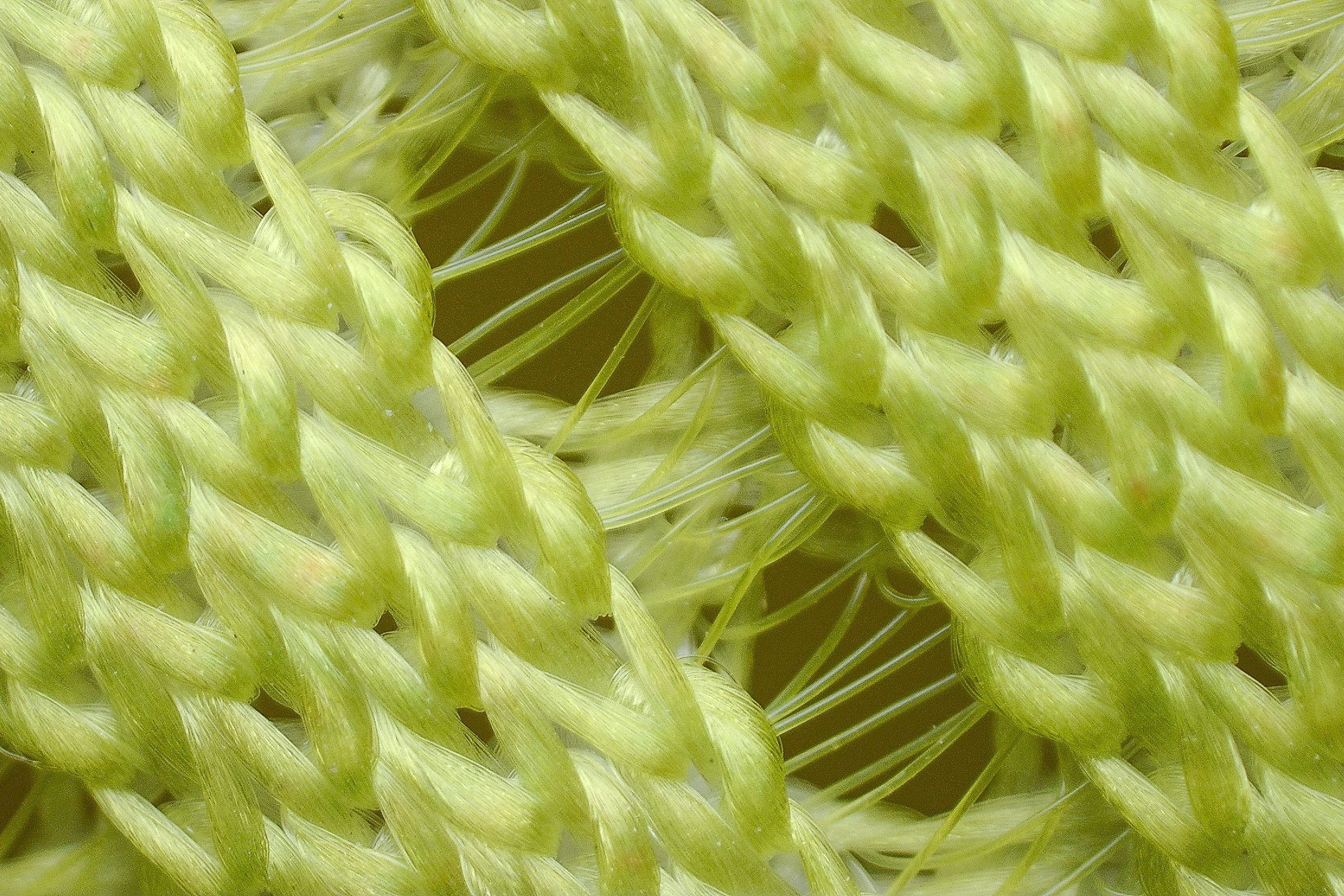
Overall, it's a weird shoe that yields a weird result in this test.
And it's important to remember that, if not for the smoke test, all other signs indicated good ventilation, including the interior layer of the upper with hundreds of perforations.
| Wave Rebellion Pro | 3 |
| Average | 3.7 |
Stability
Lateral stability test
With a whopping 51 mm of stack height in the midfoot, we knew that stability might be a challenge, regardless of the carbon plate and how firm one of the foam layers is.
After our testing, we found that the shoe is best suited for neutral runners who have excellent technique. It can be a bit tricky, especially when taking corners, but it also offers a unique and fun ride!
Torsional rigidity
Equipped with a plate, the shoe was poised to get the top score for torsional rigidity—and indeed, it secured a score of 5/5! We could barely twist it.
| Wave Rebellion Pro | 5 |
| Average | 3.5 |
Heel counter stiffness
In the heel, Mizuno opted for a slightly stiffer design compared to many racing shoes, yet it remains flexible.
Considering its instability, we believe that the stiffness rating of 2/5 that we gave the shoe is actually lower than what would be ideal.
| Wave Rebellion Pro | 2 |
| Average | 2.9 |
Midsole width - forefoot
In the midsole, we discovered a width typical of running shoes, aimed at ensuring a stable ride for midfoot and forefoot strikers.
This design works well, and while a wider option could have been intriguing, we recognize that the potential weight increase might have been a concern for performance.
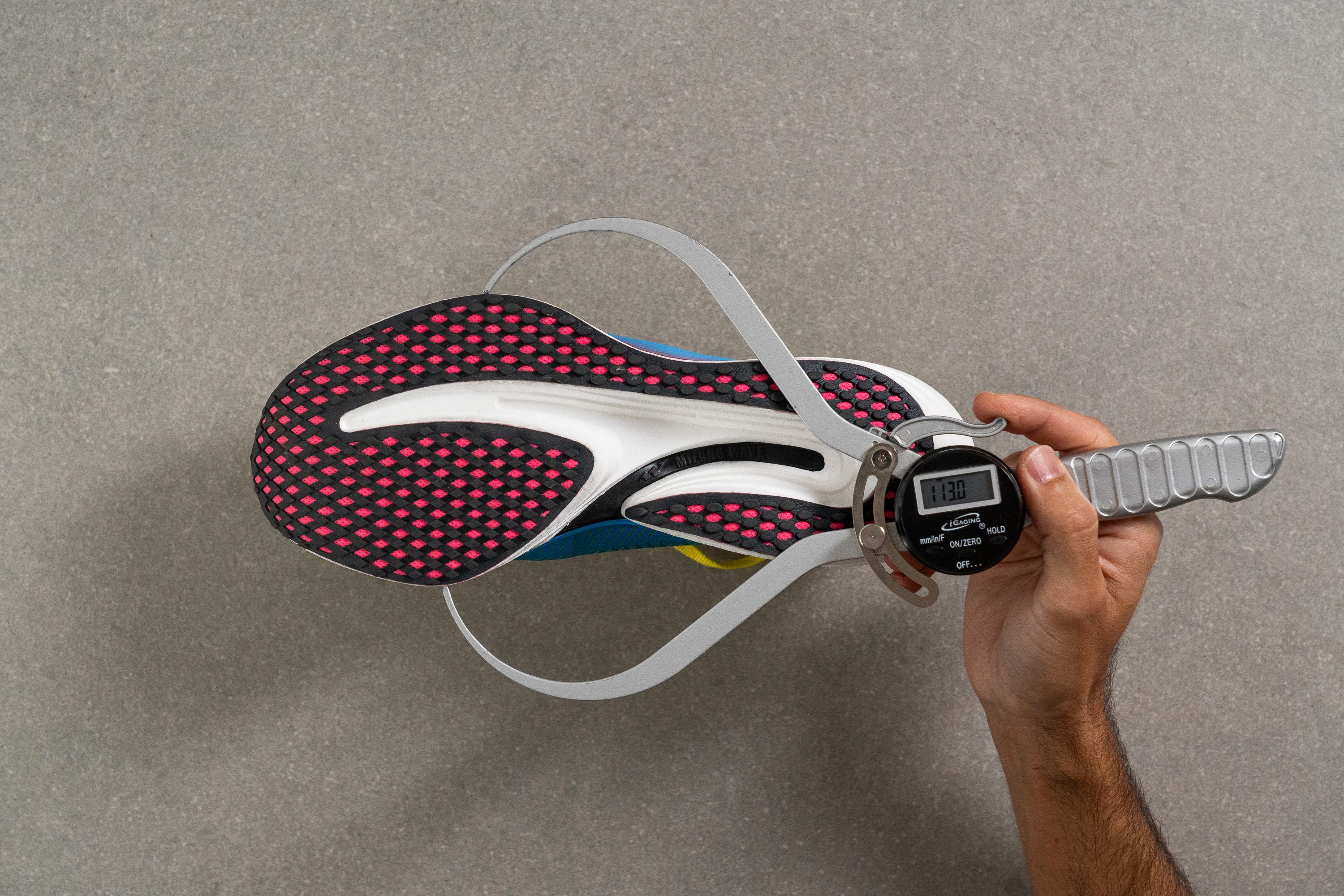
| Wave Rebellion Pro | 113.0 mm |
| Average | 114.4 mm |
Midsole width - heel
Back in the heel, we're diving again into the eye-popping details.
With a super slim width of just 78.6 mm, it's pretty obvious that this shoe isn't meant for any heel strikers out there.
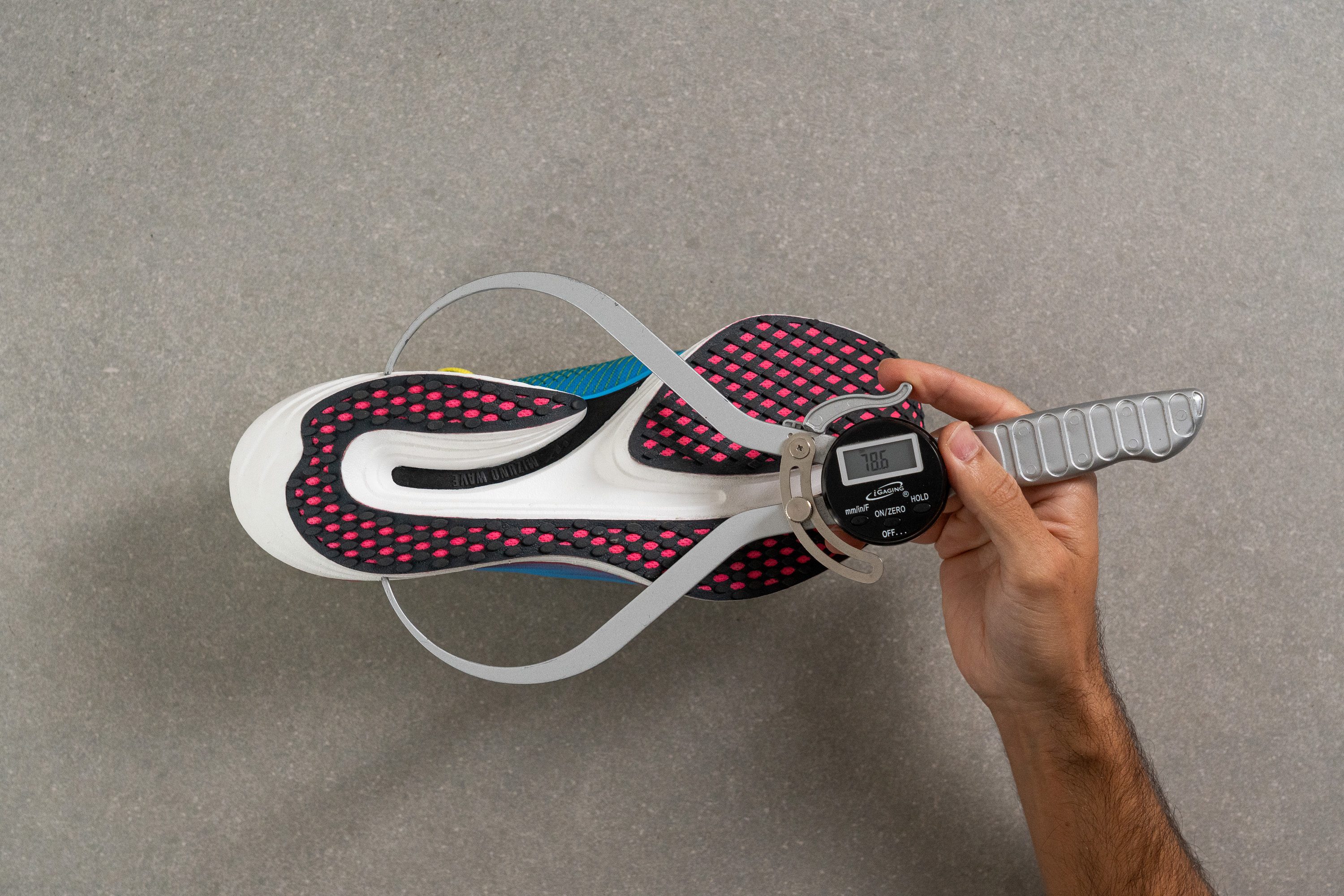
| Wave Rebellion Pro | 78.6 mm |
| Average | 90.6 mm |
Durability
Toebox durability
While shoes with low breathability sometimes make up for it with high durability, this one does not.
After we put the Wave Rebellion Pro through our Dremel test, it earned a disappointing 1/5 score. If these two factors are important to you, the Nike Alphafly 2 stands out by performing 5/5 in both areas, and it's similarly priced.
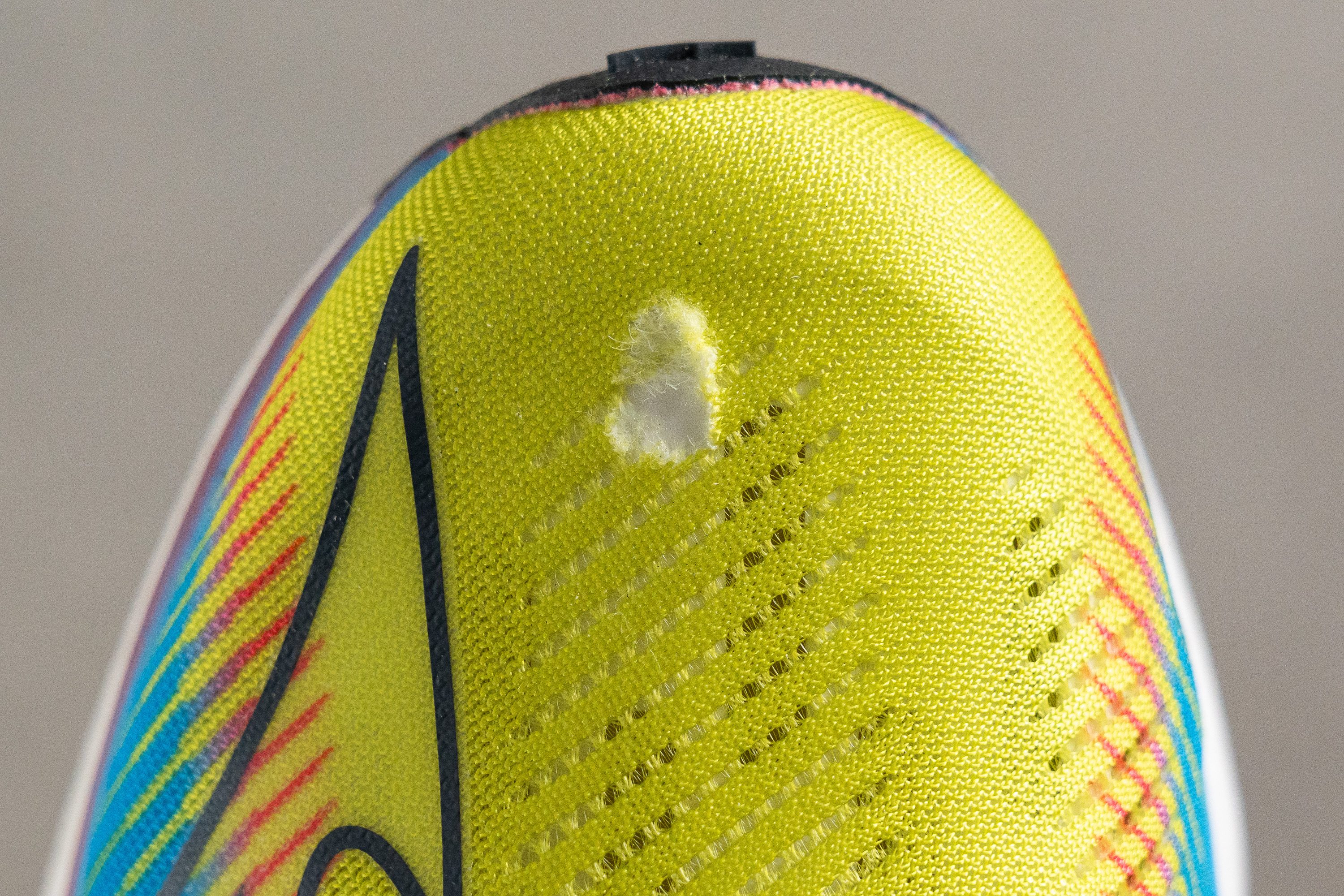
| Wave Rebellion Pro | 1 |
| Average | 2.6 |
Heel padding durability
Competition shoes typically do well in the heel padding durability test during our back-to-back dremel tests, as they often have minimal padding in this area.
However, the Wave Rebellion Pro has a lot of padding in the heel seeking comfort for long-distance races. This is why its score is lower than average at 2/5.
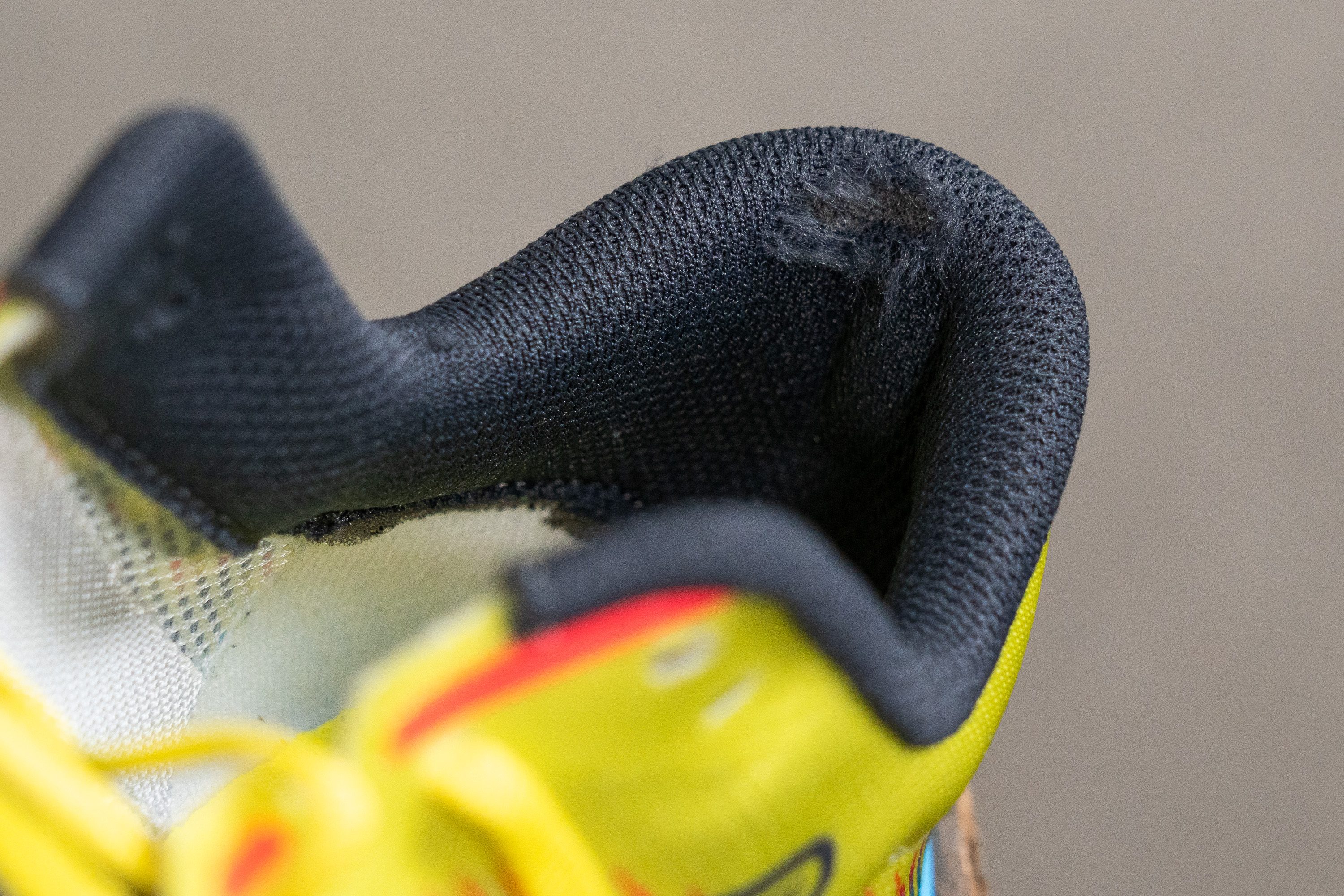
| Wave Rebellion Pro | 2 |
| Average | 3.4 |
Outsole hardness
This shoe keeps delivering surprise after surprise.
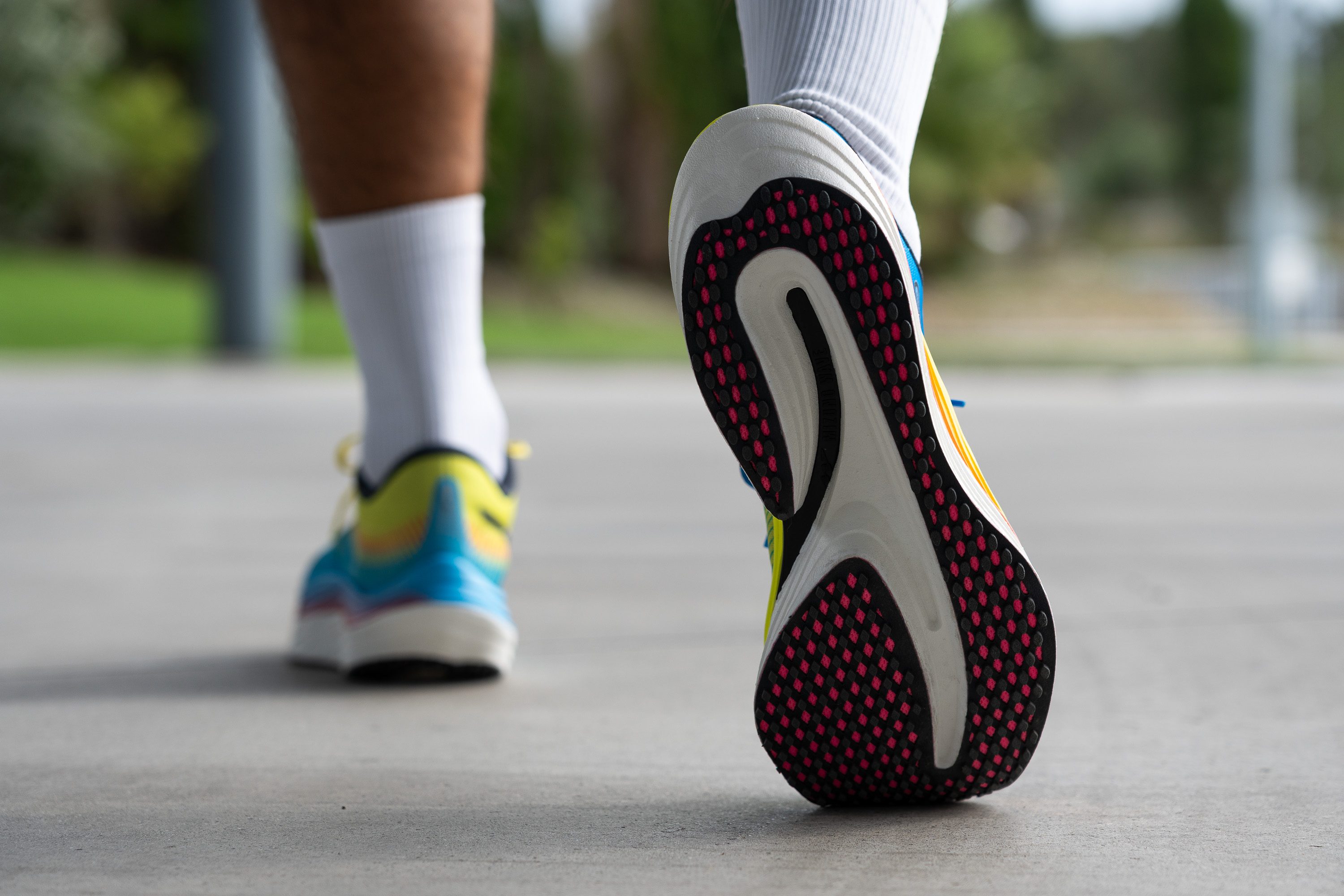
Racing shoes tend to have softer rubber in the outsole in an effort to maximize grip, but we measured actually the opposite! At 81.5 HC, is even harder than most running shoes, yet it offers A+ grip.
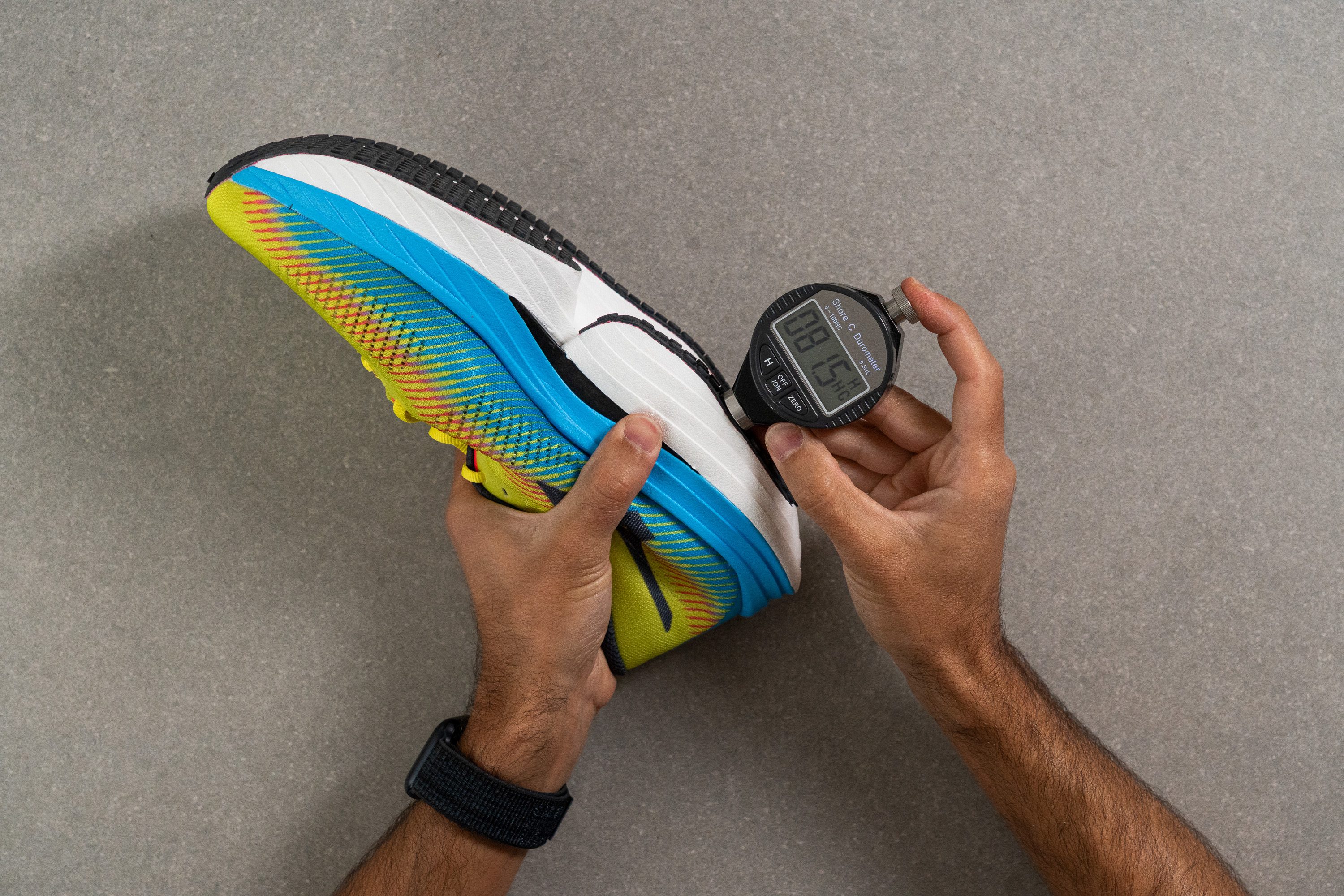
| Wave Rebellion Pro | 81.5 HC |
| Average | 79.2 HC |
Outsole durability
This shoe demonstrated twice the importance of conducting various tests to fully understand its features. As it happened with breathability, if we had only assessed the hardness and extensive coverage, we might have assumed this was a durable shoe. However, it's not.
Following our Dremel test, we observed a significant 2.6-mm indentation in the rubber. Essentially, one of the 262 mini-lugs vanished.
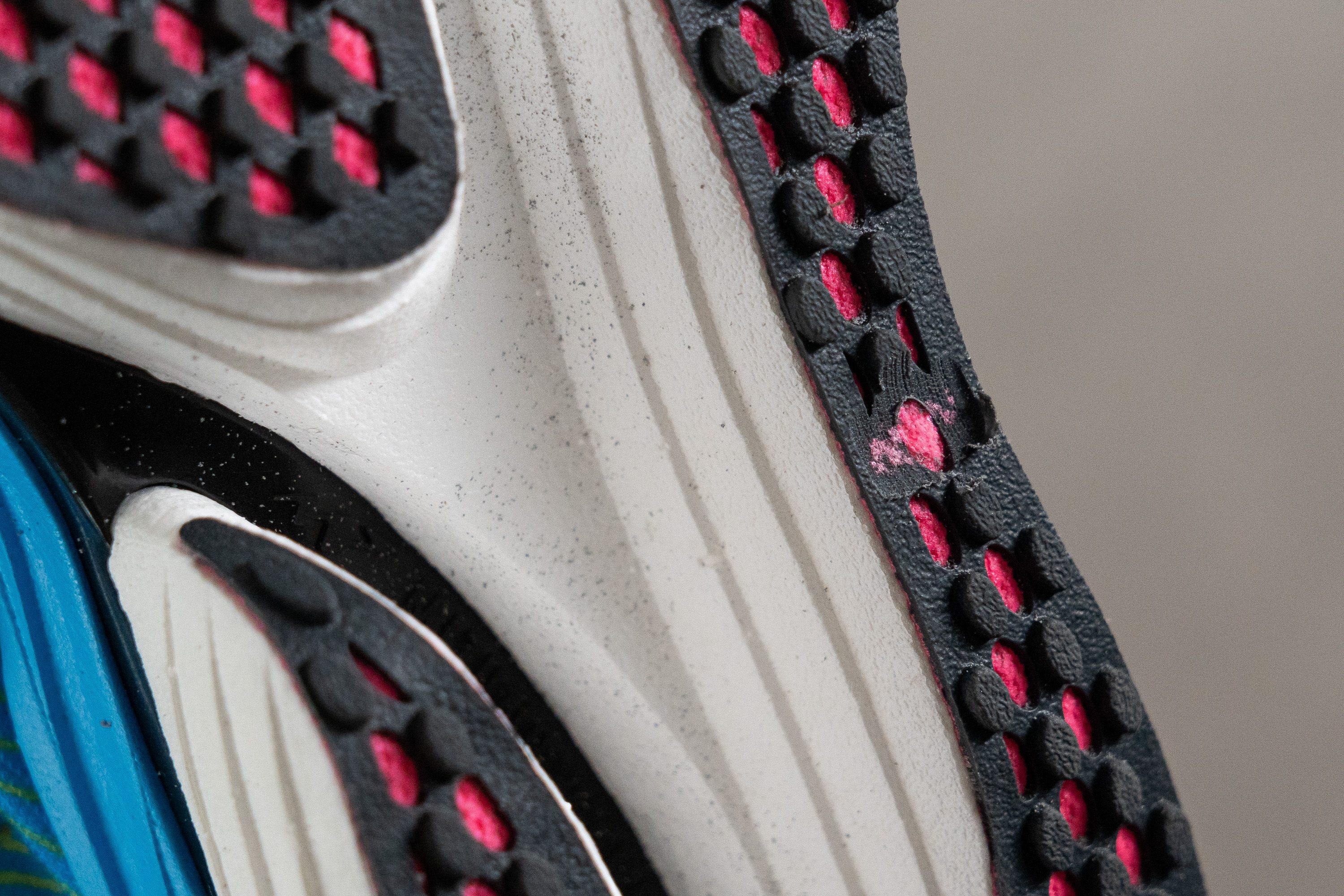
| Wave Rebellion Pro | 2.6 mm |
| Average | 1.1 mm |
Outsole thickness
Mizuno definitely knew about this problem, and that's why they added those 2.6-mm mini-lugs, aiming to boost durability.
It's pretty clear they need to up their game for the outsole in the WRP v2. Maybe a quick trip to Adidas to snag some of that Continental rubber could do the trick!
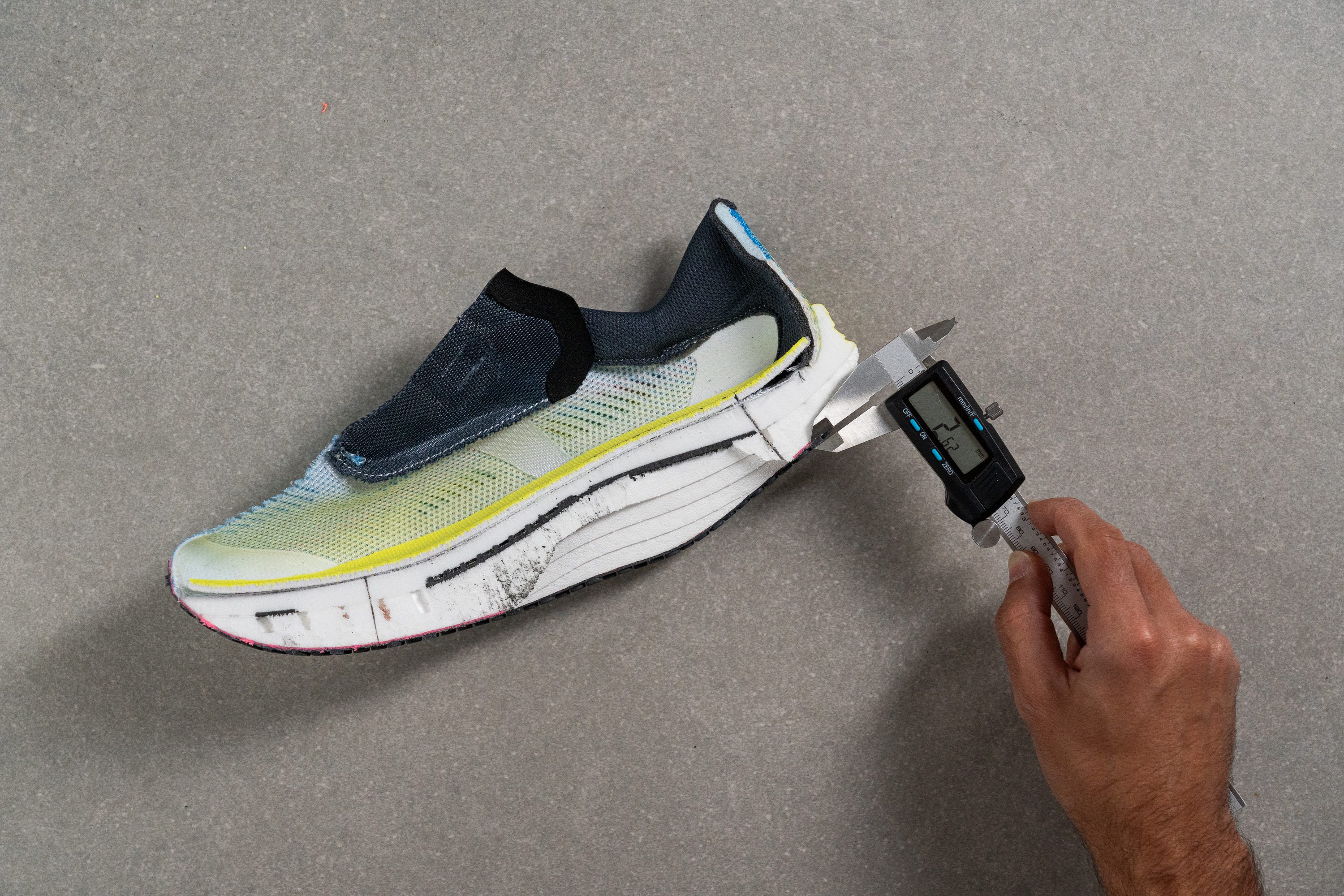
| Wave Rebellion Pro | 2.6 mm |
| Average | 3.2 mm |
Misc
Insole thickness
The insole is only 3.6 mm thick, placing it on the slimmer side. Nonetheless, we found that it feels comfortable and seems more than ready to take on the longest races!
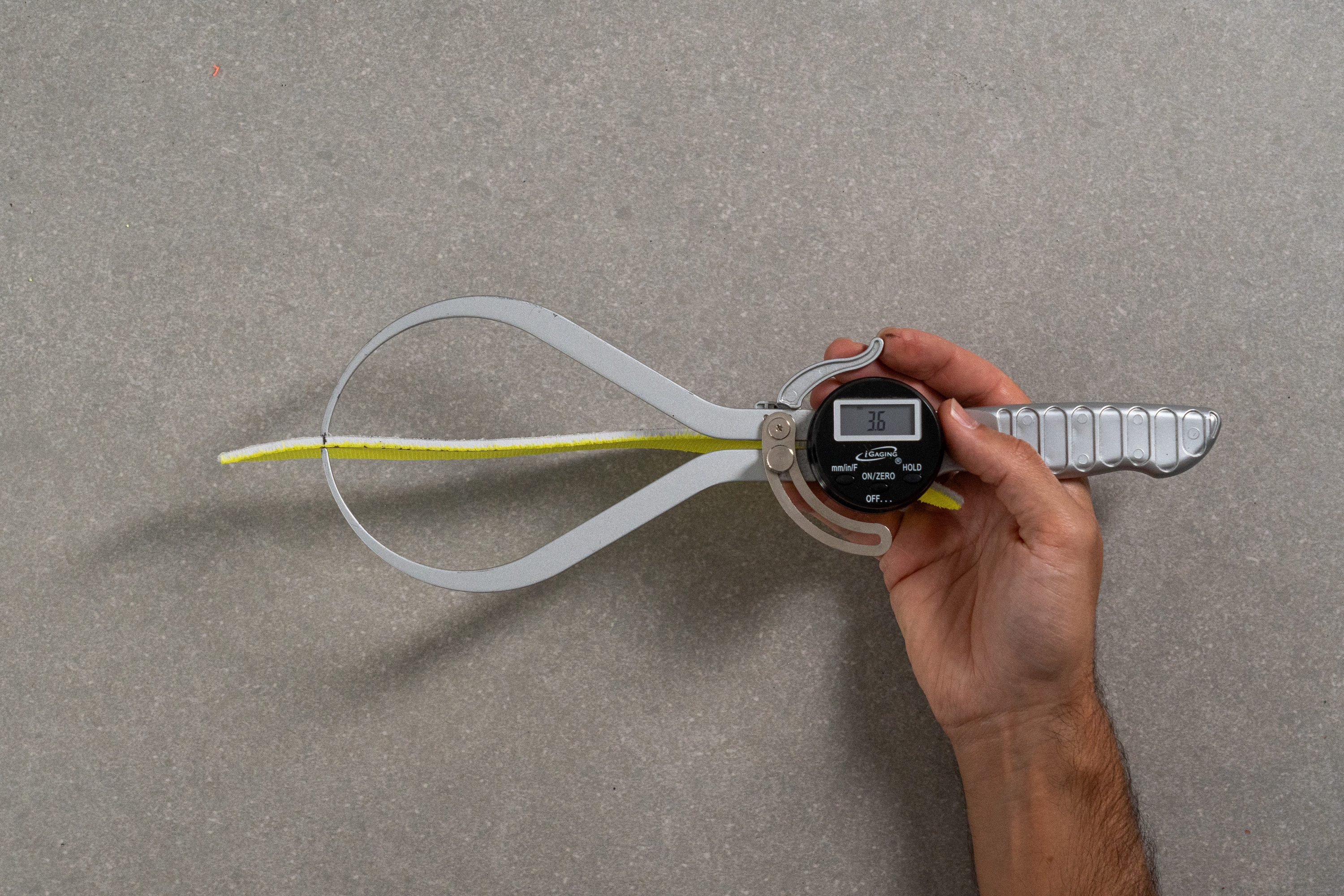
| Wave Rebellion Pro | 3.6 mm |
| Average | 4.5 mm |
Removable insole
While some competition shoes feature glued-in insoles, the Wave Rebellion Pro opts for a removable one, and we appreciate it.
However, the shoe's distinctive narrow heel and wide upper indicate that many aftermarket insoles may not fit seamlessly.
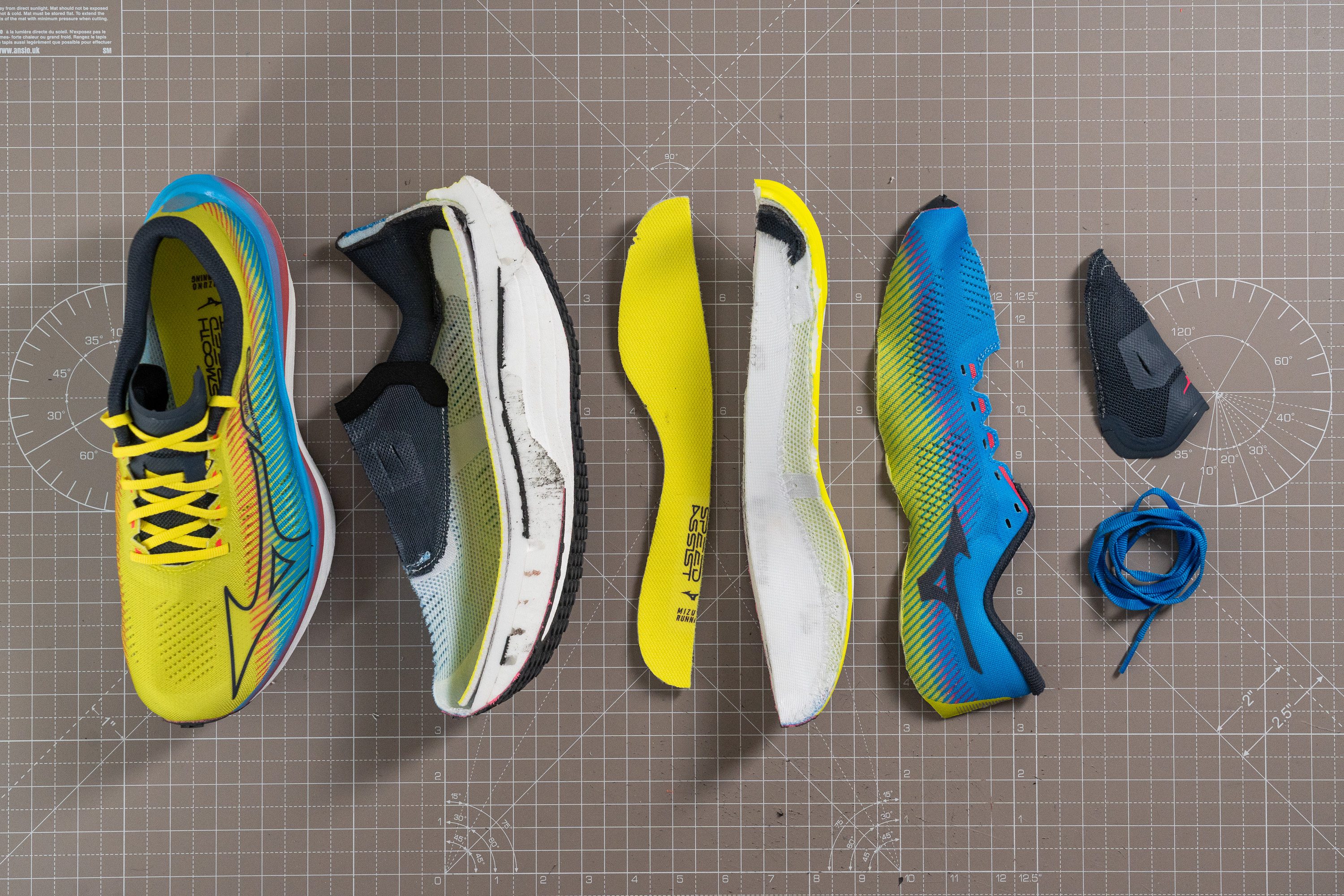
| Wave Rebellion Pro | Yes |
Midsole softness in cold (%)
After chilling the shoe in the freezer for 20 minutes to simulate cold conditions, we retested the Enerzy Lite's softness and recorded a durometer reading of 32.5 HA.
With only a minimal 6.9% increase, this shoe delivers an exceptional, world-class performance, ensuring that racing in cold temperatures—which is ideal for this shoe due to its limited breathability—becomes a fantastic and enjoyable experience.
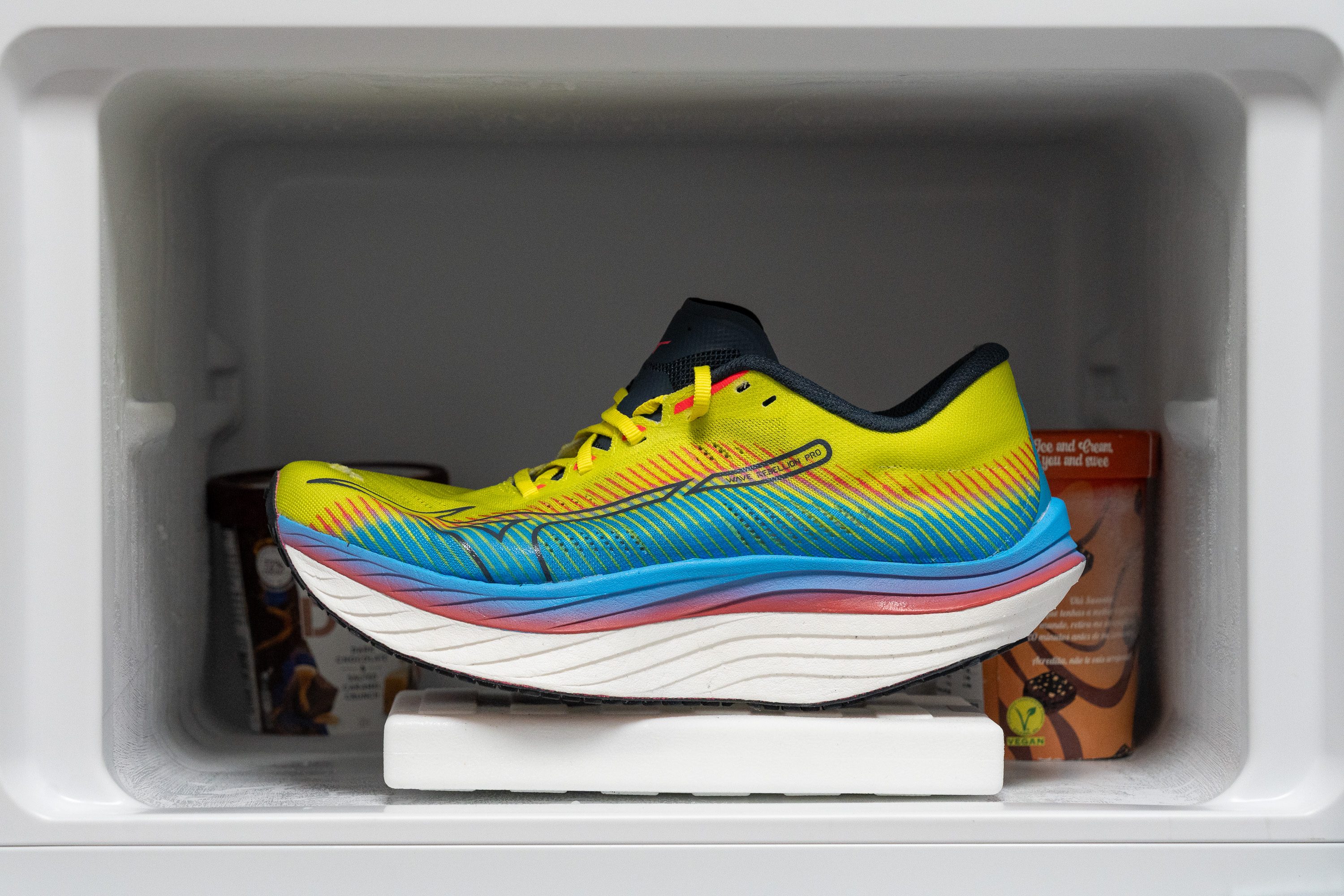
| Wave Rebellion Pro | 7% |
| Average | 24% |
Reflective elements
There aren't any reflective elements, but honestly, who needs them for road races?
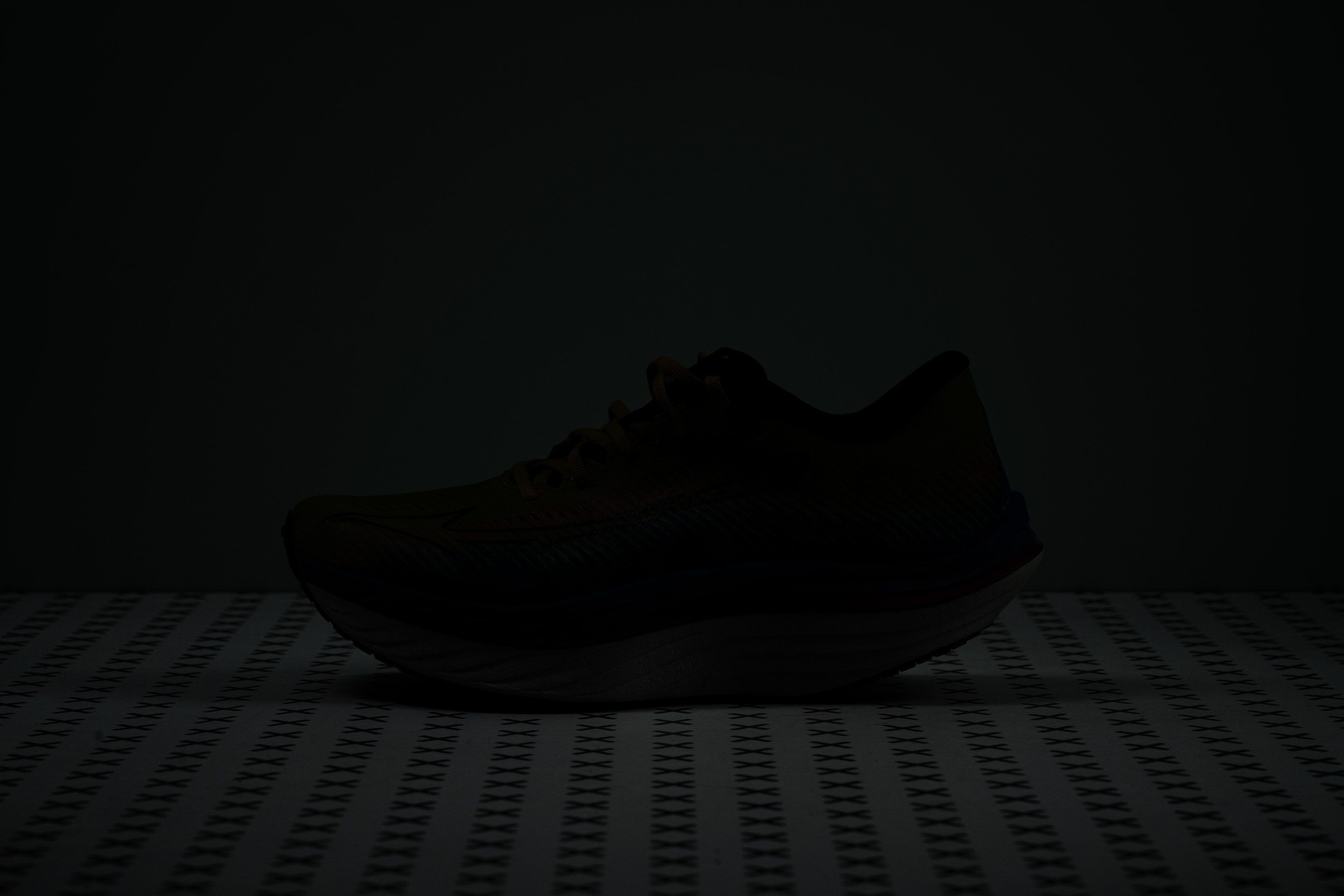
| Wave Rebellion Pro | No |
Tongue padding
The tongue is a mere 1.8 mm thick, aligning with expectations for racing shoes, yet it's more cushioned than many of its competitors.
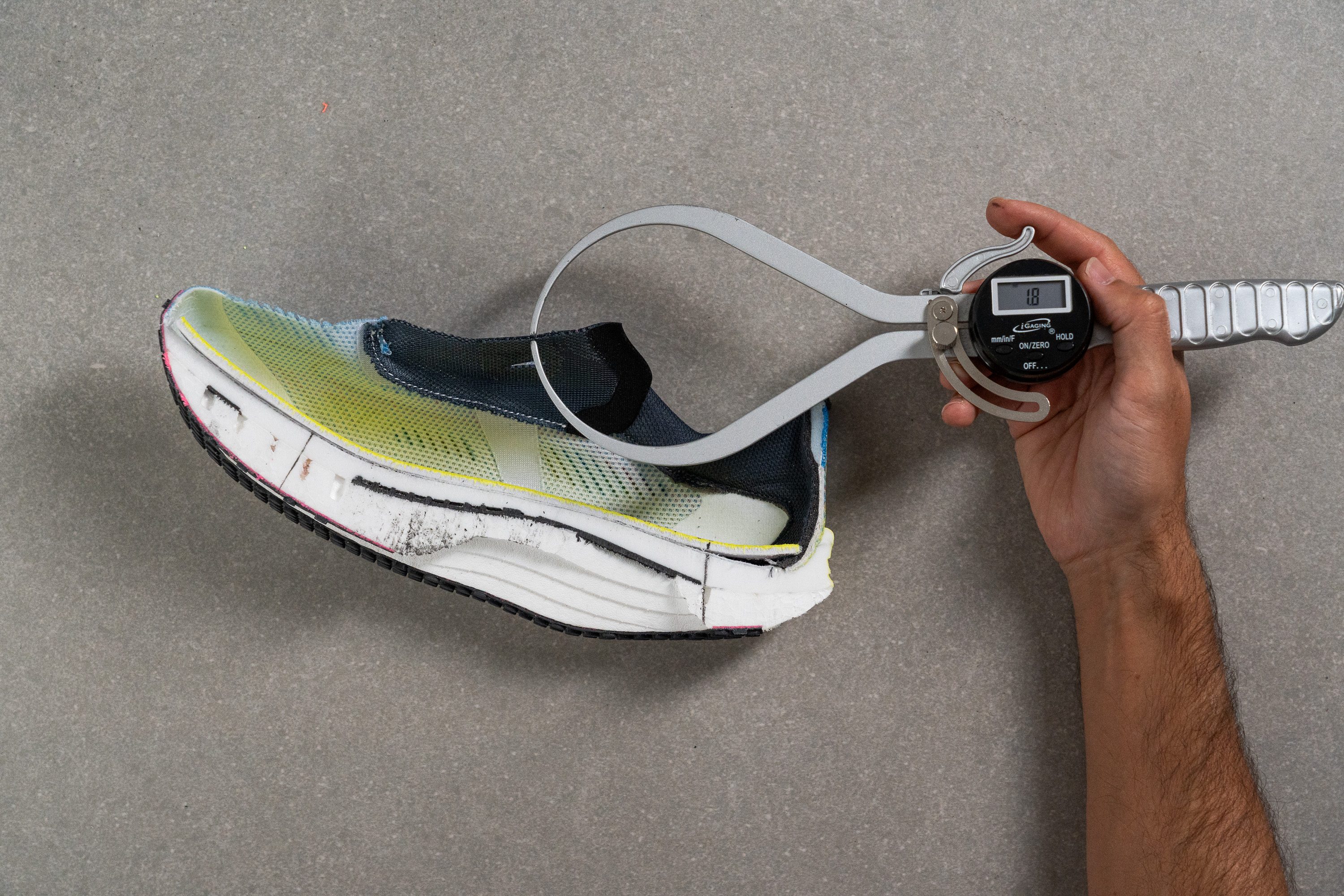
| Wave Rebellion Pro | 1.8 mm |
| Average | 5.7 mm |
Tongue: gusset type
Although we haven't noticed any unwanted shifting from the tongue, its lack of gussets (full or semi) could potentially lead to a subpar experience during races or speed workouts. This is something that really shouldn't be found in a shoe with a $250 price tag.
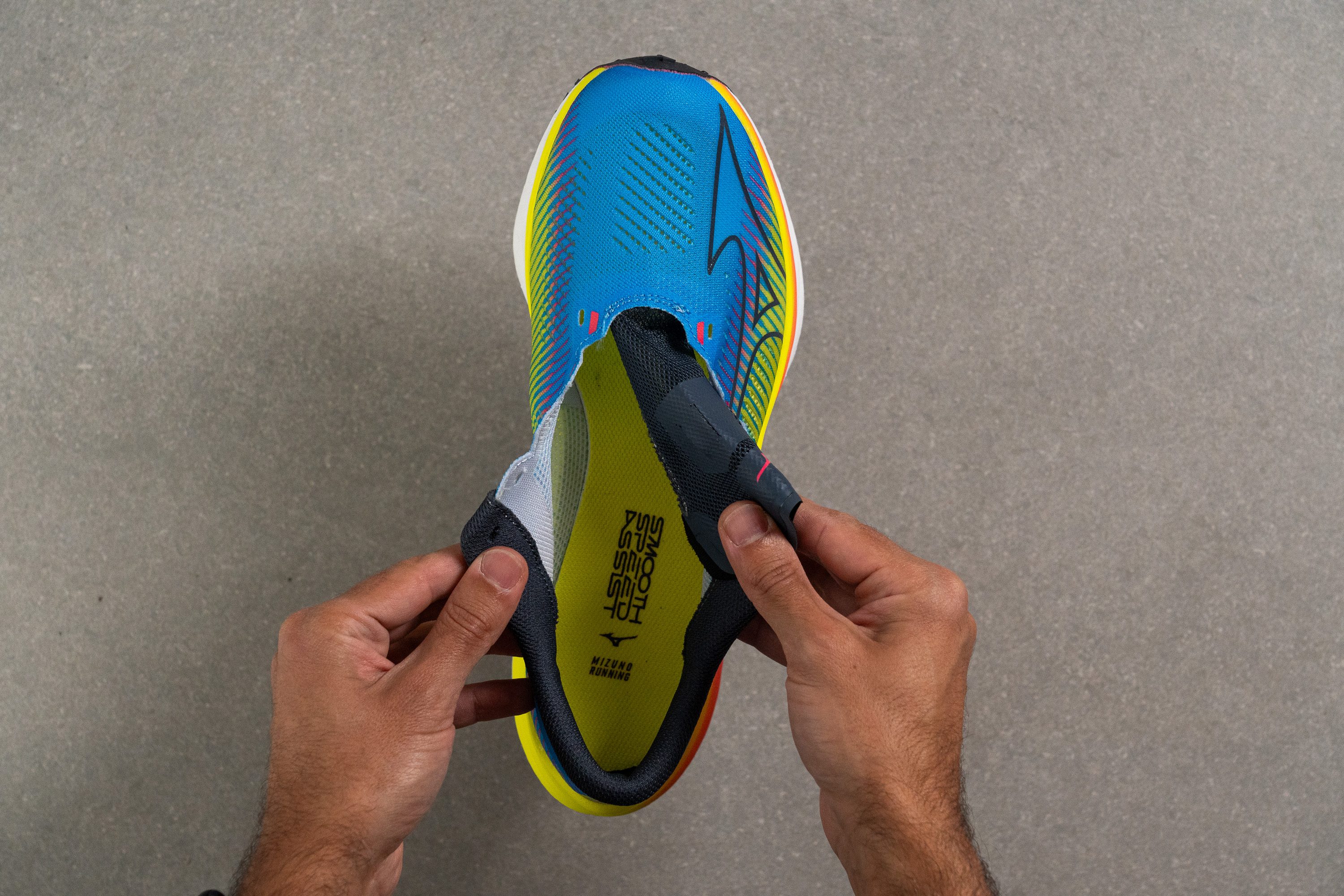
| Wave Rebellion Pro | None |
Heel tab
The desire from Mizuno to make the shoe as light as possible likely caused them to leave out the option of having a heel tab. Not a big deal, anyway.
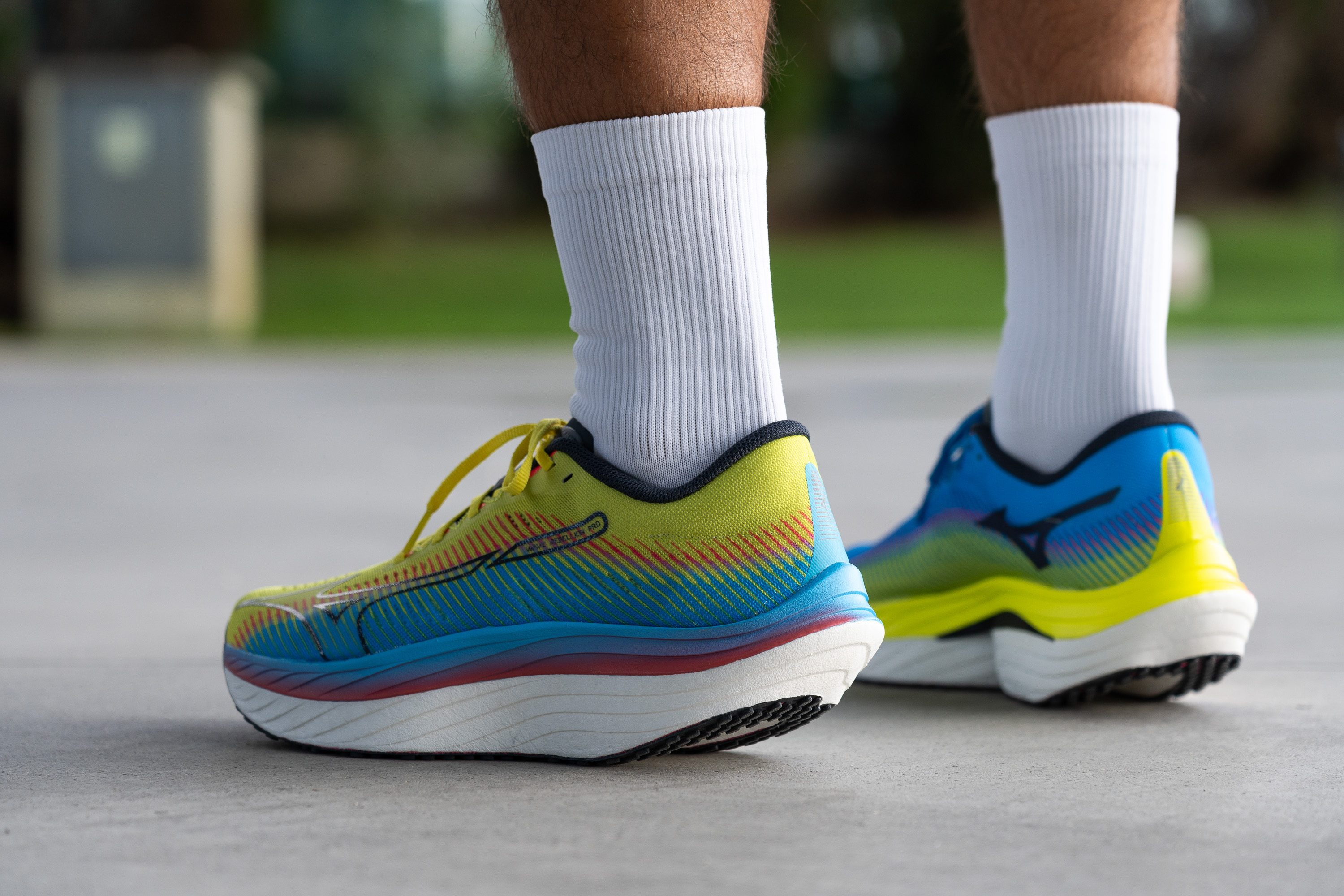
| Wave Rebellion Pro | None |

